

12+ Essay Letter Writing – Format, Examples, Writing Tips
- Letter Writing
- March 4, 2024
- School Letters
Essay Letter Writing: Essay letter writing is a form of written communication that combines the structure and format of an essay with the personal tone and conversational style of a letter. This type of school letter writing can be used to express personal thoughts and opinions on a variety of topics, from social issues to academic assignments.
In essay letter writing, the writer has the freedom to share their ideas and experiences in a unique and creative way, while also adhering to the basic principles of essay writing, such as structure, coherence, and logical argumentation. This Essay Letter Writing is an effective way to communicate complex ideas in a clear and engaging manner.
Also Check: Formal Letter Format Class 8
Essay Letter Writing – Structure of Essay Letter Writing Tips
Content in this article
Essay letter writing follows a basic structure that combines the elements of an essay with the conversational tone of a Essay Letter Writing. Here is a general outline of the structure:
- Introduction : The first paragraph introduces the topic and purpose of the Essay Letter Writing. It should be engaging and clearly state the writer’s thesis or main point.
- Body Paragraphs : The body of the Essay Letter Writing should consist of two or three paragraphs that support the thesis with relevant evidence and examples. The paragraphs should be well-organized and flow logically from one point to the next.
- Conclusion : The final paragraph summarizes the writer’s main points and restates the thesis in a clear and concise manner. Essay Letter Writing should leave the reader with a lasting impression and a call to action.
Essay Letter Writing – Sample Format
Below is a sample format for essay letter writing. This format can be adapted based on the specific purpose and audience of your essay letter:
[Your Name] [Your Address] [City, State, ZIP Code] [Email Address] [Phone Number] [Date]
[Recipient’s Name] [Recipient’s Title or Relationship] [Company, School, or Institution Name] [Address] [City, State, ZIP Code]
Dear [Recipient’s Name],
Subject: [Briefly Mention the Topic of the Essay]
I trust this letter finds you in good health and high spirits. I am writing to share my thoughts on [mention the main topic or purpose of the essay]. As someone deeply passionate about this subject, I believe it is crucial to explore and articulate my perspectives on [provide a brief overview of the essay’s focus].
Introduction: In the introduction, I aim to captivate your attention by [mention how you plan to engage the reader, e.g., sharing a personal anecdote, posing a question, or presenting a relevant quote]. This introductory section sets the stage for a comprehensive exploration of [the main theme or idea].
Body Paragraphs: The body of the essay will delve into [three to four key points or ideas related to the main theme]. Each paragraph will explore a distinct aspect, supported by [examples, evidence, personal experiences, or relevant information]. This structured approach ensures a coherent and compelling presentation.
Conclusion: The concluding section will summarize the key findings and insights discussed throughout the essay. I aim to leave the reader with [a thought-provoking statement, a call to action, or a reflection on the broader implications of the topic].
I appreciate your time and consideration in reading my essay. I believe that [mention the potential impact or relevance of the essay] and look forward to any insights or feedback you may have.
Thank you for your attention.
[Your Full Name] [Your Title or Affiliation, if applicable] [Your Signature – if sending a physical letter]
Feel free to customize this template based on the specific topic, purpose, and recipient of your essay letter. Adjust the language, tone, and content to suit the nature of the essay and the preferences of your audience.
Essay-Letter Writing – Example
Here’s an example of Essay Letter Writing:
Dear [Recipient],
I am writing to share my recent experience with essay writing. As you may know, essay writing is a crucial skill that is required in many academic settings, including college and university courses.
Recently, I had to write an essay on the topic of climate change and its impact on the environment. At first, I found it challenging to organize my thoughts and ideas in a logical and coherent manner. However, with the help of some research and a lot of hard work, I was able to create a well-written essay that received a high grade.
Through this experience, I have learned that essay writing is not just about putting words on paper; it is about expressing ideas and arguments in a clear and persuasive manner. Additionally, I have realized that careful planning and organization are essential for producing a successful essay.
Overall, I am grateful for the opportunity to improve my essay writing skills and I hope to continue honing them in the future.
Sincerely, [Your Name]
Essay – Letter Writing – Example
Essay Letter Writing About Social Media
Here’s an Essay Letter Writing About Social Media
I am writing to share my thoughts on the topic of social media and its impact on our lives. In today’s world, social media has become an integral part of our daily routines, and it is hard to imagine life without it.
While social media has its advantages, such as staying connected with friends and family and accessing a wealth of information, it also has its drawbacks. One of the biggest issues with social media is the spread of misinformation and fake news. Many people tend to believe whatever they read online, without fact-checking or verifying the sources.
Furthermore, social media can also have negative effects on mental health. It is easy to fall into the trap of comparing ourselves to others and feeling inadequate, which can lead to anxiety and depression.
In my opinion, it is important to strike a balance when it comes to social media usage. We should be mindful of the information we consume and make sure it is accurate and reliable. Additionally, we should limit our time on social media and use it in moderation, so as not to let it consume our lives.
Thank you for taking the time to read my thoughts on this important topic.
Essay Letter Writing About Social Media
Essay Letter Writing for Students
Below is an Essay Letter Writing suitable for students:
[Recipient’s Name] [Recipient’s Title or Position] [School or Institution Name] [Address] [City, State, ZIP Code]
Subject: Exploring the Importance of Extracurricular Activities for Student Development
I hope this letter finds you in good health and high spirits. As a student at [Your School/College Name], I am writing to share my thoughts on the significance of participating in extracurricular activities for overall student development.
Introduction: In today’s dynamic educational landscape, the role of extracurricular activities goes beyond the traditional classroom setting. These activities encompass a wide range of opportunities for students to explore their interests, develop essential skills, and foster a well-rounded personality.
Body: Paragraph 1: Broadening Horizons Engaging in extracurricular activities exposes students to diverse fields beyond their academic curriculum. It provides a platform to discover and explore various interests, allowing students to broaden their horizons and gain a more comprehensive understanding of the world.
Paragraph 2: Skill Development Participating in clubs, sports, or cultural activities enhances the development of crucial life skills. Teamwork, leadership, time management, and communication are just a few examples of skills that students can acquire through active involvement in extracurricular pursuits. These skills are not only valuable during the school years but also play a pivotal role in shaping a successful future.
Paragraph 3: Building Character Extracurricular activities contribute significantly to character building. Students learn to overcome challenges, face competition, and cope with both success and failure. These experiences foster resilience, perseverance, and a strong sense of responsibility, qualities that are integral to personal growth.
Paragraph 4: Holistic Development The combination of academic excellence and active participation in extracurricular activities leads to holistic development. Students who strike a balance between their studies and interests tend to perform well academically while also developing a more well-rounded and adaptable personality.
Conclusion: In conclusion, I firmly believe that encouraging students to engage in extracurricular activities is crucial for their holistic development. These activities not only complement academic learning but also nurture qualities that are essential for success in the ever-evolving global landscape.
I look forward to discussing this topic further and exploring ways to promote and support extracurricular involvement among students at [Your School/College Name]. Thank you for your time and consideration.
[Your Full Name] [Your Grade/Class] [Your Signature – if sending a physical letter]
Feel free to customize this letter based on your specific thoughts, experiences, and the requirements of your essay assignment.
Writing an Essay in Letter Form
Writing an essay in letter form involves combining the structure of a formal or informal letter with the content and structure of an essay. Here is a sample essay in letter form:
[Recipient’s Name] [Recipient’s Title or Position] [Organization or Institution Name] [Address] [City, State, ZIP Code]
Subject: Exploring the Impact of Technology on Education
I trust this letter finds you well. As a concerned student passionate about the role of technology in education, I am writing to share my insights on how technological advancements are shaping the learning landscape.
Introduction: Technology has become an integral part of our lives, and its influence on education is undeniable. In this letter, I aim to examine the positive and negative impacts of technology on the educational experience, shedding light on its transformative effects.
Paragraph 1: Positive Impacts One of the notable positive impacts of technology on education is the accessibility of information. The internet has opened up vast repositories of knowledge, making learning resources readily available to students worldwide. This accessibility has democratized education, breaking down barriers to information.
Paragraph 2: Interactive Learning Furthermore, technology has revolutionized the way we learn. Interactive tools, simulations, and virtual classrooms create an engaging and dynamic learning environment. These tools not only cater to diverse learning styles but also foster critical thinking and problem-solving skills.
Paragraph 3: Global Connectivity The interconnected world facilitated by technology allows students to connect with peers and experts globally. Collaborative projects, online forums, and virtual exchange programs contribute to a richer and more diverse educational experience.
Paragraph 4: Challenges and Concerns However, with the benefits come challenges. The digital divide, unequal access to technology, and concerns about privacy and online security are critical issues that need addressing. Balancing the integration of technology while ensuring equitable opportunities for all students is a pressing concern.
Conclusion: In conclusion, the impact of technology on education is profound and multifaceted. While it presents exciting opportunities for enhanced learning, we must address the challenges to create an inclusive educational landscape that benefits all.
I welcome the opportunity to discuss these ideas further and explore strategies for leveraging technology responsibly in education. Thank you for considering my perspective.
Feel free to customize this template based on your specific topic and the guidelines provided for your assignment. Adjust the tone, style, and content to suit the nature of your essay and your audience.
Essay Letter Writing Template
Below is a template that you can use for essay letter writing. This template is a general structure; you can customize it based on the specific topic or purpose of your essay.
[Your Name] [Your Address] [City, State, ZIP Code] [Email Address] [Date]
Introduction: Begin your letter with a brief introduction. Clearly state the purpose of your letter and provide a hook to engage the reader’s interest.
Body Paragraphs: Divide the body of your letter into paragraphs, each addressing a specific point or idea related to your essay topic.
- Introduce the topic of your essay.
- Provide background information to set the context.
- Clearly state your thesis or the main point you will be discussing.
- Introduce and discuss the first supporting point.
- Provide evidence, examples, or facts to strengthen your argument.
- Explain the relevance of this point to your overall argument.
- Introduce and discuss the second supporting point.
- Provide evidence, examples, or facts to support this point.
- Explain how this point connects to your thesis.
- Acknowledge potential counterarguments.
- Refute or address counterarguments, demonstrating the strength of your position.
- Summarize the key points discussed in your essay.
- Reinforce the importance of your thesis.
- Provide a smooth transition to the conclusion.
Conclusion: Conclude your letter by summarizing the main points and restating the significance of your topic or argument. End with a call to action, a thought-provoking statement, or a question to leave a lasting impression.
Closing: End your letter with a formal closing. Choose a closing phrase that matches the tone and purpose of your essay.
[Your Full Name] [Your Signature – if sending a physical letter]
Feel free to adapt this template of Essay Letter Writing based on the specific requirements of your essay or the guidelines provided for your assignment. Adjust the tone, style, and content to suit the nature of your essay and your audience.
Formal Essay Letter Writing
When writing an Essay Letter Writing in Formal tone, you want to maintain a professional tone while effectively conveying your thoughts. Below is a formal Essay Letter Writing:
Subject: An Examination of Environmental Sustainability Practices in [Organization/Institution Name]
I trust this letter finds you in good health. As a dedicated student of [Your School/College Name], I am writing to bring attention to the importance of adopting sustainable practices within our institution, specifically in the context of environmental conservation.
Introduction: Environmental sustainability is an issue of global concern, and its implications resonate across various sectors, including education. In this letter, I aim to shed light on the benefits of implementing eco-friendly initiatives within [Organization/Institution Name] and the positive impact it can have on our community and beyond.
Paragraph 1: The Need for Environmental Sustainability The pressing need for environmental sustainability arises from the escalating challenges posed by climate change. By incorporating sustainable practices within our institution, we contribute to the global effort to mitigate the adverse effects of environmental degradation.
Paragraph 2: Implementing Green Initiatives I propose the implementation of green initiatives, such as waste reduction, energy conservation, and the incorporation of renewable energy sources. These initiatives not only align with global sustainability goals but also instill a sense of environmental responsibility among students, faculty, and staff.
Paragraph 3: Educational Opportunities Furthermore, embracing environmental sustainability provides unique educational opportunities. By incorporating sustainable practices into our curriculum, we equip students with the knowledge and skills needed to address complex environmental issues in their future endeavors.
Conclusion: In conclusion, the integration of environmental sustainability practices within [Organization/Institution Name] is not only a responsibility we owe to the planet but also an opportunity to foster a culture of environmental stewardship among the members of our institution.
I welcome the opportunity to discuss these proposals further and explore feasible ways to initiate and support sustainable practices within our institution. Thank you for considering these recommendations.
Feel free to adapt this formal Essay Letter Writing based on the specific topic and guidelines provided for your assignment. Ensure that the tone remains formal and that the content aligns with the expectations of a formal letter.
Job Application Essay Letter Writing
Below is a job application Essay Letter Writing that you can use as a reference:
[Employer’s Name] [Company Name] [Company Address] [City, State, ZIP Code]
Dear [Employer’s Name],
Subject: Application for [Job Position] – [Your Full Name]
I am writing to express my sincere interest in the [Job Position] advertised on your company’s website. With a strong background in [Relevant Skills or Experience], I am confident in my ability to contribute effectively to your team and the success of [Company Name].
Introduction: In my current role at [Your Current Company], I have successfully [highlight a significant accomplishment or responsibility related to the job]. This experience has equipped me with [mention specific skills or qualities] that align with the requirements of the [Job Position] at [Company Name].
Body: Paragraph 1: Why I am a Strong Candidate I am particularly drawn to [Company Name] due to its commitment to [mention any specific values, projects, or achievements of the company]. My [mention number of years] years of experience in [Your Industry or Field] have honed my ability to [mention key responsibilities or skills relevant to the job].
Paragraph 2: Key Skills and Achievements I possess a proven track record in [mention relevant skills or achievements], as evidenced by [provide specific examples or metrics]. These experiences have sharpened my [mention soft skills] and my ability to [mention any other relevant strengths].
Paragraph 3: Why I Want to Join [Company Name] I am attracted to [Company Name] because of its reputation for [mention any specific aspects of the company culture, projects, or values that resonate with you]. I am eager to contribute my skills and learn from the talented team at [Company Name].
Conclusion: In conclusion, I am excited about the opportunity to contribute to [Company Name] and am confident in my ability to excel in the [Job Position]. I look forward to the possibility of discussing how my skills and experiences align with your company’s needs in further detail.
Thank you for considering my application. I am eager to further discuss how my qualifications make me a strong fit for this position.
Feel free to customize this Essay Letter Writing for job application based on your specific experiences, skills, and the requirements of the job you are applying for.
Essay Letter Writing for Different Audiences
Essay Letter Writing for different audiences involves tailoring your content, tone, and approach based on the specific group you are addressing. Below are examples of Essay Letter Writing for different audiences:
1. Essay Letter Writing to Parents – Topic: Importance of Extracurricular Activities for Student Development
[Your Name] [Your Grade/Class] [Date]
[Parents’ Names] [Parents’ Address]
Dear Mom and Dad,
I hope this letter finds you both well. As your son/daughter and a student at [Your School], I wanted to share my thoughts on the significance of participating in extracurricular activities for overall student development.
[Continue with the body of the essay, discussing benefits, personal experiences, and the impact on academic and personal growth.]
2. Essay Letter Writing to Teachers – Topic: The Role of Technology in Enhancing Classroom Learning
[Teacher’s Name] [School Name]
Dear [Teacher’s Name],
I trust this letter finds you well. As a student in your [Subject] class, I would like to explore the impact of technology on classroom learning and how it can enhance the educational experience for both students and teachers.
[Continue with the body of the essay, discussing positive impacts, examples, and potential challenges.]
3. Essay Letter Writing to Friends – Topic: The Benefits of Reading for Personal Growth
[Your Name] [Date]
[Friends’ Names]
Dear Friends,
I hope you’re doing great. Recently, I’ve been reflecting on the many benefits of reading and how it contributes to personal growth. I thought I’d share my thoughts with you.
[Continue with the body of the essay, discussing the joys of reading, cognitive benefits, and the impact on personal development.]
[Your Full Name]
4. Essay Letter Writing to the Editor – Topic: Addressing Environmental Concerns in Our Community
[Your Name] [Your Address] [City, State, ZIP Code] [Date]
[Editor’s Name] [Newspaper/Magazine Name] [Address]
Dear Editor,
I am writing to bring attention to the environmental concerns in our community, specifically focusing on [specific issue]. It is imperative that we address these issues to ensure a sustainable future.
[Continue with the body of the essay, providing information, possible solutions, and urging community involvement.]
[Your Full Name] [Your Contact Information]
Feel free to customize these letters of Essay Letter Writing for different audiences based on the specific audience and topic you are addressing. Adjust the language, tone, and content to suit the relationship and communication style appropriate for each audience.
Essay Letter Writing About Pollution – Email Format
Here’s an Email Format of Essay Letter Writing about Pollution:
I am writing to you today to express my deep concern about the issue of pollution. In recent years, pollution has become a major problem that is affecting our environment, our health, and our future. It is a global issue that needs to be addressed urgently.
Pollution is caused by various factors, including industrial activities, transportation, and waste disposal. The consequences of pollution are dire, including climate change, respiratory problems, and biodiversity loss. It is important that we take action to reduce our carbon footprint, recycle waste materials, and limit the use of harmful chemicals.
As citizens of this planet, we all have a responsibility to protect our environment and reduce pollution. I urge you to join me in taking action to reduce pollution in our daily lives. We can start by using public transportation, conserving energy, and practicing responsible waste disposal.
Let’s work together to create a healthier and more sustainable future for ourselves and generations to come.
Essay Letter Writing for Various Occasions
Essay Letter Writing for various occasions involves tailoring your content to the specific event or celebration. Below are examples of Essay Letter Writing for different occasions:
1. Essay Letter Writing for Graduation – Reflecting on the Journey
[Your Name] [Graduation Date]
[Principal’s Name] [School Name]
Dear Principal [Principal’s Last Name],
As I stand on the threshold of a new chapter in my life, I find myself reflecting on the incredible journey that has led me to this moment. Graduation is not just a culmination of academic achievements, but a celebration of growth, resilience, and the bonds formed in these hallowed halls.
[Continue with the body of the essay, reflecting on memorable experiences, friendships, and the lessons learned during the academic journey.]
[Your Full Name] [Your Graduation Class]
2. Essay Letter Writing for Thanksgiving – Gratitude for Family and Friends
[Recipient’s Name] [Recipient’s Address]
As Thanksgiving approaches, I find myself overwhelmed with gratitude for the blessings in my life, particularly the cherished relationships with family and friends. In the spirit of thankfulness, I wanted to take a moment to express my heartfelt appreciation for the impact you have had on my life.
[Continue with the body of the essay, expressing specific reasons for gratitude, fond memories, and the significance of the relationship.]
Warm regards,
3. Essay Letter Writing for a Birthday Celebration – Reflecting on Another Year
[Your Name] [Birthday Date]
[Recipient’s Name]
As I celebrate another year of life, I am prompted to reflect on the experiences, growth, and joys that this journey has brought. Birthdays are not just a marker of passing time; they are a celebration of the lessons learned, the relationships cherished, and the memories created.
[Continue with the body of the essay, reflecting on the past year, expressing gratitude, and sharing hopes for the future.]
Cheers to another year,
4. Essay Letter Writing for New Year’s Resolutions – Setting Intentions for the Year Ahead
As the New Year approaches, it offers a fresh canvas on which to paint the aspirations, goals, and intentions for the coming months. In the spirit of new beginnings, I wanted to share my reflections on the year gone by and outline the resolutions that will guide my path in the year ahead.
[Continue with the body of the essay, reflecting on achievements and challenges of the past year, and outlining specific resolutions.]
Wishing you a wonderful New Year,
Feel free to customize these letters of Essay Letter Writing in different occasions based on the specific occasion and your personal sentiments. Adjust the language, tone, and content to suit the nature of the event or celebration.
College Admission Essay Letter Writing
Writing a college admission Essay Letter Writing is an important step in the application process. Below is a sample college admission essay letter:
[College Admissions Office] [College/University Name] [College/University Address] [City, State, ZIP Code]
Dear Admissions Committee,
I am writing to express my sincere interest in joining the [College/University Name] community as a [Your Intended Major] major. As a passionate and dedicated student, I am eager to contribute to and benefit from the academic environment and unique opportunities offered by your esteemed institution.
Introduction: Ever since I attended [Your High School Name], I have been inspired by the pursuit of knowledge and a desire to make a positive impact on the world. [Provide a brief introduction to your academic background and interests.]
Why [College/University Name]? [College/University Name] stands out to me as the ideal place to further my academic journey due to [mention specific reasons such as renowned faculty, exceptional programs, unique resources, or a particular campus culture]. The [Your Intended Major] program, in particular, aligns perfectly with my academic and career aspirations.
Unique Qualities and Achievements: Throughout high school, I have consistently demonstrated my commitment to excellence in [mention specific academic or extracurricular achievements]. These experiences have not only shaped my character but have also prepared me for the challenges and opportunities that a rigorous academic environment like [College/University Name] provides.
Contributions to Campus Life: I am excited about the prospect of contributing to the vibrant campus life at [College/University Name]. My experiences in [mention relevant extracurricular activities or community service] have instilled in me a sense of leadership, teamwork, and social responsibility.
Personal Growth and Goals: Beyond academics, I see [College/University Name] as a platform for personal growth and exploration. I am eager to immerse myself in the diverse learning experiences, engage with a community of like-minded individuals, and broaden my perspectives.
Conclusion: In conclusion, I believe that my passion for [Your Intended Major], commitment to academic excellence, and dedication to contributing positively to campus life make me a strong candidate for admission to [College/University Name]. I am excited about the prospect of becoming a valuable member of your community and contributing to the rich tapestry of experiences at [College/University Name].
Thank you for considering my application. I look forward to the opportunity to contribute to and benefit from the vibrant academic environment at [College/University Name].
[Your Full Name] [Your High School Graduation Year] [Your Signature – if sending a physical letter]
Feel free to customize this letter based on your specific experiences, aspirations, and the requirements of the college or university you are applying to. It’s important to convey your unique qualities, achievements, and reasons for choosing the institution.
FAQS for Essay Letter Writing – Format, Examples, Writing Tips
What is the basic format for an essay letter writing.
The basic format of Essay Letter Writing includes a salutation, introduction, body paragraphs, and a conclusion. Include your contact information, date, and a closing signature. The structure may vary depending on the type of letter and audience.
How do I start an essay letter?
Start with a salutation addressing the recipient. In the introduction, engage the reader with a compelling hook, such as a question, quote, or personal anecdote, to draw them into your essay.
What should I include in the body paragraphs of an essay letter?
Each body paragraph should focus on a specific point or idea related to your topic. Include supporting evidence, examples, or personal experiences to strengthen your arguments or convey your message effectively.
How do I end an essay letter?
Conclude your essay letter by summarizing key points, reiterating the main message, or providing a call to action. End with a closing statement that leaves a lasting impression on the reader.
Can you provide examples of Essay Letter Writing for different purposes?
Certainly! Essay Letter Writing Examples include job application essay letters, college admission essay letters, letters to friends on specific topics, and letters addressing various occasions. Tailor the content based on the purpose and audience.
Essay Letter Writing is an important skill that has been around for centuries. It serves as a means of communication and expression of ideas and emotions. With the advancement of technology, letter writing has evolved, but its importance has not diminished. Whether it is a formal business letter or a personal letter to a friend, the art of letter writing requires attention to detail, clear communication, and an understanding of the audience.
Related Posts
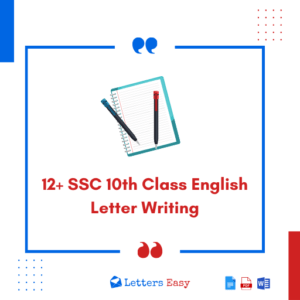
12+ SSC 10th Class English Letter Writing Format, Tips, Examples
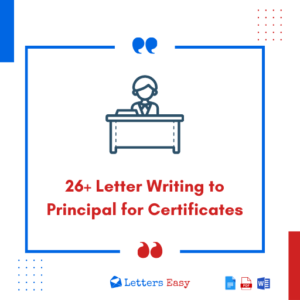
26+ Letter Writing to Principal for Certificates – Format & Samples

20+ Letter Writing in English for Class 6 – Examples, Tips, Topics

10+ Samples for Write a Letter to your Principal for 3 Days Leave

25+ Undertaking Letter Format for Students – Tips, Examples

30+ Sick Leave Letter to Class Teacher from Parents – Templates
Leave a reply cancel reply.
Your email address will not be published. Required fields are marked *
Name *
Email *
Add Comment
Save my name, email, and website in this browser for the next time I comment.
Post Comment

Sample Essays
The breadth of Georgetown’s core curriculum means that students are required to write for a wide variety of academic disciplines. Below, we provide some student samples that exhibit the key features the most popular genres. When reading through these essays, we recommend paying attention to their
1. Structure (How many paragraphs are there? Does the author use headers?)
2. Argument (Is the author pointing out a problem, and/or proposing a solution?)
3. Content (Does the argument principally rely on facts, theory, or logic?) and
4. Style (Does the writer use first person? What is the relationship with the audience?)
Philosophy Paper
- Singer on the Moral Status of Animals
Theology Paper
- Problem of God
- Jewish Civilization
- Sacred Space and Time
- Phenolphthalein in Alkaline Solution
History Paper
- World History
Literature Review
Comparative Analysis
Policy Brief
- Vaccine Manufacturing
White Paper
Critical Analysis
- Ignatius Seminar
Tips for Writing an Effective Application Essay

How to Write an Effective Essay
Writing an essay for college admission gives you a chance to use your authentic voice and show your personality. It's an excellent opportunity to personalize your application beyond your academic credentials, and a well-written essay can have a positive influence come decision time.
Want to know how to draft an essay for your college application ? Here are some tips to keep in mind when writing.
Tips for Essay Writing
A typical college application essay, also known as a personal statement, is 400-600 words. Although that may seem short, writing about yourself can be challenging. It's not something you want to rush or put off at the last moment. Think of it as a critical piece of the application process. Follow these tips to write an impactful essay that can work in your favor.
1. Start Early.
Few people write well under pressure. Try to complete your first draft a few weeks before you have to turn it in. Many advisers recommend starting as early as the summer before your senior year in high school. That way, you have ample time to think about the prompt and craft the best personal statement possible.
You don't have to work on your essay every day, but you'll want to give yourself time to revise and edit. You may discover that you want to change your topic or think of a better way to frame it. Either way, the sooner you start, the better.
2. Understand the Prompt and Instructions.
Before you begin the writing process, take time to understand what the college wants from you. The worst thing you can do is skim through the instructions and submit a piece that doesn't even fit the bare minimum requirements or address the essay topic. Look at the prompt, consider the required word count, and note any unique details each school wants.
3. Create a Strong Opener.
Students seeking help for their application essays often have trouble getting things started. It's a challenging writing process. Finding the right words to start can be the hardest part.
Spending more time working on your opener is always a good idea. The opening sentence sets the stage for the rest of your piece. The introductory paragraph is what piques the interest of the reader, and it can immediately set your essay apart from the others.
4. Stay on Topic.
One of the most important things to remember is to keep to the essay topic. If you're applying to 10 or more colleges, it's easy to veer off course with so many application essays.
A common mistake many students make is trying to fit previously written essays into the mold of another college's requirements. This seems like a time-saving way to avoid writing new pieces entirely, but it often backfires. The result is usually a final piece that's generic, unfocused, or confusing. Always write a new essay for every application, no matter how long it takes.
5. Think About Your Response.
Don't try to guess what the admissions officials want to read. Your essay will be easier to write─and more exciting to read─if you’re genuinely enthusiastic about your subject. Here’s an example: If all your friends are writing application essays about covid-19, it may be a good idea to avoid that topic, unless during the pandemic you had a vivid, life-changing experience you're burning to share. Whatever topic you choose, avoid canned responses. Be creative.
6. Focus on You.
Essay prompts typically give you plenty of latitude, but panel members expect you to focus on a subject that is personal (although not overly intimate) and particular to you. Admissions counselors say the best essays help them learn something about the candidate that they would never know from reading the rest of the application.
7. Stay True to Your Voice.
Use your usual vocabulary. Avoid fancy language you wouldn't use in real life. Imagine yourself reading this essay aloud to a classroom full of people who have never met you. Keep a confident tone. Be wary of words and phrases that undercut that tone.
8. Be Specific and Factual.
Capitalize on real-life experiences. Your essay may give you the time and space to explain why a particular achievement meant so much to you. But resist the urge to exaggerate and embellish. Admissions counselors read thousands of essays each year. They can easily spot a fake.
9. Edit and Proofread.
When you finish the final draft, run it through the spell checker on your computer. Then don’t read your essay for a few days. You'll be more apt to spot typos and awkward grammar when you reread it. After that, ask a teacher, parent, or college student (preferably an English or communications major) to give it a quick read. While you're at it, double-check your word count.
Writing essays for college admission can be daunting, but it doesn't have to be. A well-crafted essay could be the deciding factor─in your favor. Keep these tips in mind, and you'll have no problem creating memorable pieces for every application.
What is the format of a college application essay?
Generally, essays for college admission follow a simple format that includes an opening paragraph, a lengthier body section, and a closing paragraph. You don't need to include a title, which will only take up extra space. Keep in mind that the exact format can vary from one college application to the next. Read the instructions and prompt for more guidance.
Most online applications will include a text box for your essay. If you're attaching it as a document, however, be sure to use a standard, 12-point font and use 1.5-spaced or double-spaced lines, unless the application specifies different font and spacing.
How do you start an essay?
The goal here is to use an attention grabber. Think of it as a way to reel the reader in and interest an admissions officer in what you have to say. There's no trick on how to start a college application essay. The best way you can approach this task is to flex your creative muscles and think outside the box.
You can start with openers such as relevant quotes, exciting anecdotes, or questions. Either way, the first sentence should be unique and intrigue the reader.
What should an essay include?
Every application essay you write should include details about yourself and past experiences. It's another opportunity to make yourself look like a fantastic applicant. Leverage your experiences. Tell a riveting story that fulfills the prompt.
What shouldn’t be included in an essay?
When writing a college application essay, it's usually best to avoid overly personal details and controversial topics. Although these topics might make for an intriguing essay, they can be tricky to express well. If you’re unsure if a topic is appropriate for your essay, check with your school counselor. An essay for college admission shouldn't include a list of achievements or academic accolades either. Your essay isn’t meant to be a rehashing of information the admissions panel can find elsewhere in your application.
How can you make your essay personal and interesting?
The best way to make your essay interesting is to write about something genuinely important to you. That could be an experience that changed your life or a valuable lesson that had an enormous impact on you. Whatever the case, speak from the heart, and be honest.
Is it OK to discuss mental health in an essay?
Mental health struggles can create challenges you must overcome during your education and could be an opportunity for you to show how you’ve handled challenges and overcome obstacles. If you’re considering writing your essay for college admission on this topic, consider talking to your school counselor or with an English teacher on how to frame the essay.
Related Articles
Essay Writing Guide
Essay Format
Essay Format: A Basic Guide With Examples
10 min read
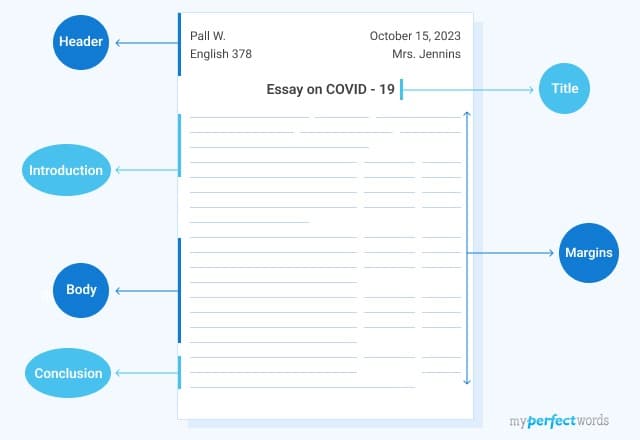
People also read
An Easy Guide to Writing an Essay
Learn How to Write An Essay in Simple Steps
A Complete 500 Word Essay Writing Guide
A Catalog of 500+ Essay Topics for Students
Explore Different Types of Essays, their Purpose, and Sub-types
Learn How to Create a Perfect Essay Outline
How to Start an Essay- A Step-by-Step Guide
A Complete Essay Introduction Writing Guide With Examples
20+ Hook Examples to Grab Reader’s Attention
The Ultimate Guide to Writing Powerful Thesis Statement
20+ Thesis Statement Examples for Different Types of Essays?
How to Write a Topic Sentence: Purpose, Tips & Examples
Learn How to Write a Conclusion in Simple Steps
Transition Words For Essays - The Ultimate List
4 Types of Sentences - Definition & Examples
Writing Conventions - Definition, Tips & Examples
Essay Writing Problems - 5 Most Paralyzing Problems
How to Make an Essay Longer: 14 Easy Ways
How to Title an Essay - A Detailed Guide
1000 Word Essay - A Simple Guide With Examples
Are you having trouble making your essay look just right? Lots of students find formatting tricky, so you're not alone.
This guide is here to help you figure out how to format your essay. We've got examples of essays in APA, MLA, Chicago, and other styles to make it easier for you to learn.
So, keep reading – we've got you covered!
- 1. What is an Essay Format?
- 2. How To Format Essay in MLA Style
- 3. How to Format Essay in APA
- 4. How to Format Essay in Chicago Style
- 5. Formatting In-Text Citations: APA, MLA, and Chicago Styles
- 6. How to Determine What Format to Follow
What is an Essay Format?
An essay format refers to a set of guidelines that decides how the elements of your paper should be arranged. No matter what type of essay you’re writing, formatting is an essential step in the essay writing process.
The format guidelines cover the essay structure, title, citations, and the basic outline of the essay.
When formatting a paper, there are certain things that you need to pay attention to. These include the structure of an essay, title page, works cited page, and citation styles .
Here is a basic essay format template:
How To Format Essay in MLA Style
Formatting an essay in MLA style is a common requirement in many academic settings, particularly in the humanities.
MLA provides guidelines for various aspects of your essay, from font and margins to citations and bibliography. Here’s an essay format MLA you can use as a reference:
MLA Essay Format Template
- Title Page: MLA does not typically require a separate title page. Instead, place your title at the top of the first page, centered, and do not use bold, italics, or underline for the title. Below the title, include your name, the instructor's name, the course name and number, and the due date, each on a separate line, left-aligned.
- Header and Page Numbers: Create a header with your last name and page number in the upper right corner of every page, half an inch from the top, and flush with the right margin. For example: Smith 1.
- Margins and Spacing: Set all margins to 1 inch, and use double-spacing throughout the essay.
- Font and Size: Use a legible font like Times New Roman or Arial, size 12.
- Indentation: Indent the first line of each paragraph by 0.5 inches, which can be done automatically using the "Tab" key.
- Paragraphs: Leave only one space after periods or other punctuation marks within sentences.
- Title: Place the title of your essay (centered) at the top of the first page. Do not use bold, italics, or underlining for the title. Capitalize major words.
- Citations: MLA uses in-text citations to acknowledge sources. When quoting or paraphrasing, include the author's last name and the page number (e.g., Smith 45).
- Works Cited Page: At the end of your essay, include a separate page titled "Works Cited." List all sources alphabetically by the author's last name. Follow the specific MLA citation style for different types of sources (books, articles, websites, etc.).
Sample MLA Essay

How to Format Essay in APA
Formatting an essay in APA style is commonly used in the social sciences and psychology.
APA provides a set of guidelines for various elements of your essay, including formatting, citations, and references. Here’s how to format essay in apa:
APA Essay Format Template
- Title Page: The title page in APA includes: Title of the Essay (centered, bold, and in title case) Your Name (centered) Institutional Affiliation (centered) Running head: [Shortened Title] (flush left, in uppercase) Page Number (flush right)
- Header and Page Numbers: Create a header with the title of your essay in all capital letters, followed by a colon and a shortened version of the title (up to 50 characters), in the upper left corner of every page. The page number should be in the upper right corner.
- Font and Size: Use a clear and readable font like Times New Roman or Arial, size 12.
- Paragraphs: Indent the first line of each paragraph by 0.5 inches. Use a hanging indent for references on the reference page.
- Citations: Use in-text citations to acknowledge sources. Include the author's last name and the publication year (e.g., Smith, 2023) when quoting or paraphrasing.
- Title: Use bold and title case for the title of your essay on the title page. On subsequent pages, use a shortened version of the title (in uppercase) as the header.
- References Page: At the end of your essay, create a separate page titled "References." List all sources alphabetically by the author's last name. Follow the specific APA citation style for different types of sources (books, articles, websites, etc.).
Sample APA Essay

How to Format Essay in Chicago Style
Formatting an essay in Chicago style, often used in history and some other humanities disciplines, requires specific guidelines for citations and formatting. Here are the guidelines to format your essay in Chicago style:
Chicago Essay Format Template
- Title Page: The title page in Chicago style includes: Title of the Essay (centered, in headline-style capitalization) Your Name (centered) Course Name and Number (centered) Instructor's Name (centered) Date (centered)
- Margins and Spacing: Set all margins to 1 inch. Use double-spacing throughout the essay.
- Page Numbers: Number pages in the upper right corner of each page, beginning with the first page of the main text (usually page 1). Page numbers should be in Arabic numerals (1, 2, 3, etc.).
- Paragraphs: Indent the first line of each paragraph by 0.5 inches. Use a block paragraph style with no extra space between paragraphs.
- Citations: In Chicago style, you have two citation options: footnotes and endnotes. In your text, place a superscript number (e.g., ^1) at the end of the sentence containing the cited information. Corresponding footnotes or endnotes should provide full citation details.
- Title: Use headline-style capitalization for the title of your essay (e.g., "The History of Ancient Civilizations").
- Bibliography: At the end of your essay, include a separate page titled "Bibliography." List all sources alphabetically by the author's last name. Follow the specific Chicago citation style for different types of sources (books, articles, websites, etc.).
Sample Chicago Essay

Formatting In-Text Citations: APA, MLA, and Chicago Styles
An in-text citation is a brief reference within the body of your essay or research paper that indicates the source of information you have incorporated into your writing.
Each of the formatting style have a unique way for adding in-text citations:
In APA style, remember to include the author's last name, the publication date, and the page number (if applicable) within parentheses.
Example: "The impact of climate change on biodiversity is a growing concern (Smith, 2020, p. 27)."
In MLA style, provide the author's last name and the page number without any punctuation between them.
Example: "The impact of climate change on biodiversity is a growing concern (Jones 42)."
Chicago Style Format
The Chicago Manual of Style offers two distinct options for in-text citations:
- Author-Date Style: In this approach, you place your citations within parentheses directly within the text. This style involves citing the author's last name and the publication date within the body of your text. Example: (Smith 2021) or "According to Smith (2021),..."
- Notes and Bibliography Style: This style utilizes numbered footnotes or endnotes to provide citations. Instead of placing citations within the text, you include a superscript number at the end of the relevant sentence, which corresponds to a full citation located in a footnote at the bottom of the page (or endnotes at the end of the document). Example: Johnson argues that "the data is unconvincing."¹ Nevertheless, Smith contends that the study makes "a compelling case" for this plan of action.²
Each of these Chicago citation styles has its unique advantages and is chosen based on the requirements of the assignment or the preferences of the writer.
How to Determine What Format to Follow
Selecting the appropriate citation format for your academic writing is essential to ensure that your work meets the expected standards. To make an informed decision, consider the following factors:
Subject and Discipline
- APA Style: Primarily used in the social sciences, such as psychology, sociology, and education. It is also common in business and nursing disciplines.
- MLA Style: Commonly employed in humanities disciplines, including literature, languages, and cultural studies. It's widely used for papers related to literature and the arts.
- Chicago Style: Used in history, some social sciences, and certain humanities disciplines. Chicago offers both author-date and notes and bibliography styles, making it versatile for various subjects.
Professor's Instructions
Always adhere to your professor's specific instructions regarding citation style and writing convention . Professors may have preferences or requirements based on the nature of the course or assignment.
For instance, an English professor might prefer MLA for literary analysis, while a psychology professor may opt for APA to encourage familiarity with research norms. However, when formatting styles are not specified by the instructor, you can follow whatever is appropriate for your subject.
Institutional Guidelines
Your educational institution may have established guidelines or standards for citation formats.
Check your institution's style guide or consult with academic advisors to ensure compliance with their specific requirements.
By considering the subject matter, your professor's preferences, and your institution's guidelines, you can confidently choose the appropriate citation style to enhance the clarity and professionalism of your academic writing.
Now that you've gained a solid understanding of the basics for three major formatting styles, you're well-prepared to tackle your essay formatting with confidence.
Whether you're crafting an essay, a research paper, or any academic document, these formatting principles will help you present your ideas professionally.
If you find yourself in a time crunch, our expert writers are here to help you tackle your academic challenges in no time.
With our essay writing service , you get reliable help with any type of assignment, even with tight deadlines. Our writers are sure to deliver you 100% original papers that meet your requirements.

Write Essay Within 60 Seconds!

Nova Allison is a Digital Content Strategist with over eight years of experience. Nova has also worked as a technical and scientific writer. She is majorly involved in developing and reviewing online content plans that engage and resonate with audiences. Nova has a passion for writing that engages and informs her readers.

Paper Due? Why Suffer? That’s our Job!
Keep reading

Purdue Online Writing Lab Purdue OWL® College of Liberal Arts
Essay Writing

Welcome to the Purdue OWL
This page is brought to you by the OWL at Purdue University. When printing this page, you must include the entire legal notice.
Copyright ©1995-2018 by The Writing Lab & The OWL at Purdue and Purdue University. All rights reserved. This material may not be published, reproduced, broadcast, rewritten, or redistributed without permission. Use of this site constitutes acceptance of our terms and conditions of fair use.
The Modes of Discourse—Exposition, Description, Narration, Argumentation (EDNA)—are common paper assignments you may encounter in your writing classes. Although these genres have been criticized by some composition scholars, the Purdue OWL recognizes the wide spread use of these approaches and students’ need to understand and produce them.
This resource begins with a general description of essay writing and moves to a discussion of common essay genres students may encounter across the curriculum. The four genres of essays (description, narration, exposition, and argumentation) are common paper assignments you may encounter in your writing classes. Although these genres, also known as the modes of discourse, have been criticized by some composition scholars, the Purdue OWL recognizes the wide spread use of these genres and students’ need to understand and produce these types of essays. We hope these resources will help.
The essay is a commonly assigned form of writing that every student will encounter while in academia. Therefore, it is wise for the student to become capable and comfortable with this type of writing early on in her training.
Essays can be a rewarding and challenging type of writing and are often assigned either to be done in class, which requires previous planning and practice (and a bit of creativity) on the part of the student, or as homework, which likewise demands a certain amount of preparation. Many poorly crafted essays have been produced on account of a lack of preparation and confidence. However, students can avoid the discomfort often associated with essay writing by understanding some common genres.
Before delving into its various genres, let’s begin with a basic definition of the essay.
What is an essay?
Though the word essay has come to be understood as a type of writing in Modern English, its origins provide us with some useful insights. The word comes into the English language through the French influence on Middle English; tracing it back further, we find that the French form of the word comes from the Latin verb exigere , which means "to examine, test, or (literally) to drive out." Through the excavation of this ancient word, we are able to unearth the essence of the academic essay: to encourage students to test or examine their ideas concerning a particular topic.
Essays are shorter pieces of writing that often require the student to hone a number of skills such as close reading, analysis, comparison and contrast, persuasion, conciseness, clarity, and exposition. As is evidenced by this list of attributes, there is much to be gained by the student who strives to succeed at essay writing.
The purpose of an essay is to encourage students to develop ideas and concepts in their writing with the direction of little more than their own thoughts (it may be helpful to view the essay as the converse of a research paper). Therefore, essays are (by nature) concise and require clarity in purpose and direction. This means that there is no room for the student’s thoughts to wander or stray from his or her purpose; the writing must be deliberate and interesting.
This handout should help students become familiar and comfortable with the process of essay composition through the introduction of some common essay genres.
This handout includes a brief introduction to the following genres of essay writing:
- Expository essays
- Descriptive essays
- Narrative essays
- Argumentative (Persuasive) essays

- Writing Correction
- Online Prep Platform
- Online Course
- Speaking Assessment
- Ace The IELTS
- Target Band 7
- Practice Tests Downloads
- IELTS Success Formula
- Essays Band 9 IELTS Writing Task 2 samples – IELTS Band 9 essays
- Essays Band 8 IELTS Writing – samples of IELTS essays of Band 8
- Essays Band 7 IELTS Writing – samples of IELTS essays of Band 7
- Essays Band 6 IELTS Writing – samples of IELTS essays of Band 6
- Essays Band 5 IELTS Writing – samples of IELTS essays of Band 5
- Reports Band 9 IELTS Writing – samples of IELTS reports of Band 9 (Academic Writing Task 1)
- Reports Band 8 IELTS Writing – samples of IELTS reports of Band 8
- Reports Band 7 IELTS Writing – samples of IELTS reports of Band 7
- Letters Band 9 IELTS Writing Task 1 – samples of IELTS letters of Band 9
- Letters Band 8 IELTS Writing – samples of IELTS letters of Band 8
- Letters Band 7 IELTS Writing – samples of IELTS letters of Band 7
- Speaking Samples
- Tests Samples
- 2023, 2024 IELTS questions
- 2022 IELTS questions
- 2021 IELTS questions
- 2020 IELTS questions
- High Scorer’s Advice IELTS high achievers share their secrets
- IELTS Results Competition
- IELTS-Blog App
IELTS Writing Samples: Essay, Letter, Report
If you have no idea what an IELTS essay looks like or need to improve your writing skills – you’re in the right place. I add new essays almost every day – subscribe and get them seconds after they’ve been published.
Here you will find IELTS Writing samples (essays, letters, reports), written by students and graded by an IELTS teacher. Every task is checked, marked, has comments and suggestions. Hold the mouse over to see suggested corrections. The teacher’s summary is at the bottom of each essay.
- IELTS 2019-2020 Writing Questions with Answers
IELTS Essay – Band 9
- IELTS Essay Samples of Band 9
- IELTS essay, topic: Traffic on roads has become a problem in nearly every country in the world (solutions)
- IELTS essay, topic: In some cities the numbers of tourists seem overwhelming, why is this happening?
- IELTS essay, topic: There is a moral necessity for the richer countries to help the poorer countries (agree/disagree)
- IELTS essay, topic: Some people like to own their home while others prefer to rent it (discuss)
- IELTS essay, topic: People today find their lives more and more dominated by their jobs (agree/disagree)
- IELTS essay, topic: Women, not men, should stay at home to care for children (agree/disagree)
- IELTS essay, topic: The advantages and disadvantages of high-rise apartment living
- IELTS essay, topic: Is fashion a significant part of society, or a waste of time and money (opinion)?
- IELTS essay, topic: Is studying at university better than getting a job straight after school (opinion)?
- IELTS essay, topic: Ending the world’s reliance on fossil fuels will be a positive development (agree/disagree)
- IELTS essay, topic: Artificial Intelligence will take over the role of teachers (agree/disagree)
- IELTS essay, topic: Having a salaried job is better than being self-employed (agree/disagree)
- IELTS essay, topic: Is learning a foreign language essential or a waste of time (opinion)?
- IELTS essay, topic: Libraries are not a necessity anymore because of the digital resources available today (agree/disagree)
- IELTS essay, topic: Individuals should be responsible for funding their own retirement (agree/disagree)
- IELTS essay, topic: Is banning cars from city centres a positive or negative development?
- IELTS essay, topic: Schoolchildren today take part in short work experience sessions instead of school (positive/negative)
- IELTS essay, topic: The number of advertisements for charities is increasing, what is causing this?
- IELTS essay, topic: Should school children be given homework (opinion)?
- IELTS essay, topic: The majority of former prisoners commit further crime after their release (reasons and solutions)
- IELTS essay, topic: Only people over 18 years old should be allowed to use social media (agree/disagree)
- IELTS essay, topic: With the scale of globalisation today, it would be best to have a single world currency (agree/disagree)
- IELTS essay, topic: Should boys and girls be educated separately (opinion)?
- IELTS essay, topic: Everybody should pay a small amount from their income to help people in poverty (agree/disagree)
- IELTS essay, topic: Households should have a government-imposed limit on the amount of rubbish they produce (agree/disagree)
- IELTS essay, topic: Is it acceptable that enormous sums are paid for pieces of art when many people around the world live in poverty?
- IELTS essay, topic: Athletes and entertainers’ enormous salaries reflect our dependence on entertainment (agree/disagree)
- IELTS essay, topic: Is using physical force to discipline children acceptable (opinion)?
- IELTS essay, topic: Should governments impose extra taxes to restrict tourism in order to reduce pollution?
- IELTS essay, topic: Unemployment payments encourage people not to seek work (opinion)
- IELTS essay, topic: Do schools still need to teach handwriting and mental mathematics skills?
- IELTS essay, topic: What is the best motivation for workers – salary, job satisfaction or helping others?
- IELTS Essay, topic: In some countries private cars are now banned from city centres (advantages / disadvantages)
- IELTS Essay, topic: Some people believe that the problem of illegal drugs can be solved by legalising all drugs (agree/disagree)
- IELTS Essay, topic: Should governments or teachers be responsible for what is to be taught in schools (opinion)?
- IELTS essay, topic: Can the society cope with the larger number of elderly people and how?
- IELTS essay, topic: Should copyright materials such as music, films and books be freely available on the Internet (opinion)?
- IELTS essay, topic: Some parents think that children must do house chores (opinion)
- IELTS essay, topic: Since obesity may be caused by fast food, should the government put a tax on fast food?
- IELTS essay, topic: Some people think that sport in schools is a waste of time and resources, while others believe it is a vital part of education (opinion)
- IELTS Band 9 essay, topic: Some schools insist that students have laptops in class (advantages / disadvantages)
- IELTS Band 9 essay, topic: Today’s governments struggle to create enough housing for increasing populations while protecting the environment (opinion)
- IELTS Band 9 essay, topic: The world today is a safer place and governments should stop spending large amounts of money on their armed forces (agree/disagree).
- IELTS Band 9 essay, topic: Many people nowadays travel abroad for their university education (discuss)
- IELTS Band 9 essay, topic: Some people believe that everyone has a right to access to the Internet and governments should provide it free (agree/disagree)
- IELTS Band 9 essay, topic: Breakthroughs in medical science are the most significant advances over the last two centuries (opinion)
- IELTS Band 9 essay, topic: Some say that people should diet and exercise to lose weight, while others think they should eat better and change their lifestyle (opinion)
- IELTS Band 9 essay, topic: Should teachers be required to conform to a dress code?
- IELTS Band 9 essay, topic: Increases in fuel prices are the only way to reduce world consumption of fuel (agree/disagree)
- IELTS Band 9 essay, topic: Some people believe that teaching music in schools is vital, while others think it is unnecessary (opinion)
- IELTS Band 9 essay, topic: Some people believe that the world’s increase in population is unsustainable, while others think it is necessary and beneficial (opinion)
- IELTS Band 9 essay, topic: Wildlife population around the world has decreased by around 50 per cent, what can we do to protect wildlife?
- IELTS Band 9 essay, topic: Schools should teach their students how to survive financially in the world today (agree/disagree)

IELTS Essay – Band 8
- IELTS Essay Samples of Band 8
- IELTS essay, topic: It is better to be unemployed than work in a job you dislike (agree/disagree)
- IELTS essay, topic: Some people think that dangerous sports should be banned (discuss + opinion)
- IELTS essay, topic: Use of computers and mobile phones to communicate has a negative impact on reading and writing skills (agree/disagree)
- IELTS essay, topic: People are spending more and more time away from their families (reasons and effects)
- IELTS essay, topic: Reading newspapers and watching TV news is a waste of time (agree/disagree)
- IELTS essay, topic: Transportation of products and people is the main source of pollution (discuss + opinion)
- IELTS essay, topic: Some countries invest a significant amount of money in promoting the use of bicycles (reasons and effects)
- IELTS essay, topic: Too much attention and resources are given to the protection of wild animals and birds (agree/disagree)
- IELTS essay, topic: The purpose of education is to make individuals useful to society, not help people pursue personal ambitions (discuss + opinion)
- IELTS essay, topic: In many countries, the number of animals and plants is declining (reasons and solutions)
- IELTS essay, topic: New parents should attend parenting classes to learn how to bring up their children well (agree/disagree)
- IELTS essay, topic: Some people believe that countries should produce all the food necessary to feed their populations and import as little food as possible (agree/disagree)
- IELTS essay, topic: If a child commits a crime, should the child or the parents be punished? (discuss + opinion)
- IELTS essay, topic: The role of parents and family in the future success of a person is more important than knowledge and skills learnt at school (agree/disagree)
- IELTS essay, topic: Social media helps people to keep in touch with friends and stay on top of news and events (advantages/disadvantages)
- IELTS essay, topic: Part time courses are on the rise and students are taking them up as an alternative to full time courses (advantages/disadvantages)
- IELTS essay, topic: Some people think it is better to make more money rather than have free time (discuss + opinion)
- IELTS essay, topic: Some people argue that sports are essential, while others view sports as a leisure time activity (discuss + opinion)
- IELTS essay, topic: People in senior positions should be compensated with significantly higher salaries (agree/disagree)
- IELTS essay, topic: More and more people participate in extreme sports (reasons and solutions)
- IELTS essay, topic: Some people tend to buy products or get services instantly (reasons and effects)
- IELTS essay, topic: Many university students nowadays live away from home and their parents (advantages/disadvantages)
- IELTS essay, topic: Young people don’t communicate with older people as much as they used to (reasons and solutions)
- IELTS essay, topic: Many people do not exercise enough and eat an unhealthy diet (reasons and solutions)
- IELTS essay, topic: Some argue that governments should create nutrition and food choice laws to improve public health (discuss + opinion)
- IELTS essay, topic: Many people today are drinking sugar-based drinks (reasons and solutions)
- IELTS essay, topic: Celebrities can be poor role models for teenagers (agree/disagree)
- IELTS essay, topic: Many people try to achieve a work-life balance but fail (reasons and solutions)
- IELTS essay, topic: In many workplaces online communication has overtaken face to face meetings (advantages/disadvantages)
- IELTS essay, topic: Despite the benefits of walking, very few people walk nowadays (reasons and solutions)
- IELTS essay, topic: In many countries a lot of food is wasted (reasons and solutions)
- IELTS essay, topic: Newspapers have a significant influence on people’s ideas and opinions (reasons and solutions)
- IELTS essay, topic: The best way to solve environmental problems is to increase the price of fuel (agree/disagree)
- IELTS essay, topic: Who should discipline the children, parents or the government? (discuss + opinion)
- IELTS essay, topic: Young people aren’t spending their weekends doing outdoor activities such as hiking or mountaineering (reasons and solutions)
- IELTS essay, topic: Some think that hosting an international sporting event is beneficial for a country while others disagree (advantages / disadvantages)
- IELTS essay, topic: People should follow the customs and traditions of their new country (agree/disagree)
- IELTS essay, topic: Museums and art galleries should present only the national art (agree/disagree)
- IELTS essay, topic: Young people are facing problems at school and at home, what problems and how can parents help?
- IELTS essay, topic: Crime rates are likely to decline due to the advancements in technology (agree/disagree)
- IELTS essay, topic: Some people say that all popular TV entertainment programmes should aim to educate viewers about important social issues (agree/disagree)
- IELTS essay, topic: Young people are finding it harder to find permanent jobs (reasons and solutions)
- IELTS essay, topic: Some say that new homes should be constructed in existing cities while others argue that new towns should be built (advantages/disadvantages)
- IELTS essay, topic: Some think that young people should be free to choose any career they like, while others say that they should think more realistically about their future (opinion)
- IELTS essay, topic: In the modern world it is possible to shop, work and communicate online without face-to-face contact, is it a positive or a negative development?
- IELTS essay, topic: Excessive use of modern technologies is negatively affecting the reading and writing skills of children (agree/disagree)
- IELTS essay, topic: People who read for pleasure develop their imagination more and acquire better language skills compared to people who prefer watching television (agree/disagree)
- IELTS essay, topic: Who should be responsible for protecting the environment, individuals or the government?
- IELTS essay, topic: Children today are spending more time watching TV than in the past, is it a positive or a negative change?
- IELTS essay, topic: High-rise vs. low-rise buildings, which solution is better for a growing population?
- IELTS Essay, topic: Nowadays celebrities earn more money than politicians, what are the reasons for this?
- IELTS essay, topic: Some people think that it is fine for professional athletes to misbehave on or off the field, as long as they are playing well (opinion)
- IELTS essay, topic: Some people believe that women should be treated as equal to men when applying for a job with the police or the military, while others disagree (opinion)
- IELTS essay, topic: In many countries young people start living on their own after high school, is this a positive or negative development?
- IELTS essay, topic: In the past people wore their traditional clothes, but these days most people wear similar clothes, is this a positive or negative development?
- IELTS essay, topic: Many people support animal testing while others believe it isn’t appropriate (discuss)
- IELTS essay, topic: Some think that children should leave their family home as soon as possible while others believe they should stay for as long as they like (discuss)
- IELTS essay, topic: When new towns are planned, it is important to build more public parks or sports facilities than shopping centers (agree/disagree)
- IELTS essay, topic: Some people think that public health in a country can be improved by government making laws regarding nutritious food (agree/disagree).
- IELTS essay, topic: Nowadays many people choose ready-made food and refuse to cook at home, why and what are the advantages/disadvantages?
- IELTS essay, topic: Nowadays that many women have full time jobs, it is logical to share the housework evenly between men and women (agree/disagree)
- IELTS essay, topic: Some believe the government should take care of retirees, while others think everyone should save for their own retirement (opinion)
- IELTS essay, topic: Some people say that arts subjects are as essential as academic ones and should be part of school syllabus (agree/disagree)
- IELTS essay, topic: Nowadays people waste a lot of food, why is this happening and how to reduce waste?
- IELTS essay, topic: Some parents encourage young people to leave home while others think they should stay with the family, discuss and give your opinion
- IELTS essay, topic: What are the difficulties of learning a foreign language, and how to overcome them?
- IELTS essay, topic: Should employers pay more attention to personal qualities rather than qualifications?
- IELTS essay, topic: Some people use the Internet to search for solutions to their medical problems, is this a positive or negative development?
- IELTS essay, topic: Nowadays more and more people want to live by themselves, why is this happening?
- IELTS essay, topic: The education system is the only critical factor in the development of a country, agree/disagree (from Target Band 7 book)
- IELTS essay, topic: Obesity is becoming common among children, give reasons and solutions (from Target Band 7 book)
- IELTS essay, topic: Education in financial management should be a mandatory component of the school program, agree/disagree (from Target Band 7 book)
- IELTS essay, topic: Dieting can change a person’s life for better or worse (from Target Band 7 book)
- IELTS essay, topic: Changing drivers age limits is the best way to reduce traffic accidents (from Target Band 7 book)
- IELTS Essay, topic: Some believe that modern technology is increasing the gap between the rich and poor, while others disagree (discuss)
- IELTS essay, topic: Childcare training courses should be mandatory for all parents (agree/disagree)
- IELTS essay, topic: Many people believe that reducing speed limits is the best option for road safety improvement (agree/disagree)
- IELTS essay, topic: Nowadays families move to different countries for work and some think it has a negative effect on children (agree/disagree)
- IELTS essay, topic: Some people believe that preserving natural environment is crucial, but make no effort to do so (reasons and solutions)
- IELTS Essay, topic: Teachers are more responsible for social and intellectual development of students than parents (agree/disagree)
- IELTS essay, topic: People should not work beyond the retirement age (agree/disagree)
- IELTS essay, topic: The proportion of older people is increasing, what problems will this cause and what solutions can be suggested?
- IELTS essay, topic: Senior managers should have higher salaries than other employees (agree/disagree)
- IELTS essay, topic: Advertising affects what people think is important and has a negative effect on their lives (agree/disagree)
- IELTS essay, topic: Many believe that international tourism is bad for their country (reasons and solutions)
- IELTS essay, topic: Many museums charge for admission while others are free. Do the advantages of this outweigh the disadvantages?
- IELTS essay, topic: Some people claim that it is acceptable to use animals in medical research (discuss)
- IELTS essay, topic: should children grow up in the city or countryside (advantages/disadvantages)?
- IELTS essay, topic: should unpaid community work be mandatory in high school (agree/disagree)?
- IELTS essay, topic: the development of technology causes traditional skills to die out, agree or disagree?
- IELTS essay, topic: Why do criminals commit another offence after being punished?
- IELTS essay, topic: Schools should select students by their academic abilities, agree or disagree?
- IELTS essay, topic: Children these days are suffering from obesity, why and how can it be solved?
- IELTS essay, topic: Public libraries should only provide books, not videos or DVD, agree or disagree?
- IELTS essay, topic: Children should be engaged in paid work, agree or disagree?
- IELTS essay, topic: Should people spend a lot on weddings and birthday parties?
- IELTS Essay, topic: the positive and the negative sides of globalization
- IELTS Essay, topic: children and rules
- IELTS Essay, topic: The advantages and disadvantages of globalization
- IELTS Essay, topic: Financial education
- IELTS Essay, topic: Computers replacing teachers
- IELTS Essay, topic: Rich countries should help the poor
- IELTS Essay, topic: Events bringing people together
- IELTS Essay, topic: Computers instead of teachers

IELTS Essay – Band 7
- IELTS Essay Samples of Band 7
- IELTS essay, topic: Some people say protecting the environment is the government’s responsibility, others believe individuals should be responsible for it (opinion)
- IELTS Essay, topic: Should students travel?
- IELTS Essay, topic: Computers in the future
- IELTS Essay, topic: Working children
- IELTS Essay, topic: The Internet and communication
- IELTS Essay, topic: News on TV
- IELTS Essay, topic: Environmental problems
- IELTS Essay, topic: Capital punishment
- IELTS Essay, topic: Should tobacco be prohibited?
- IELTS Essay, topic: Should wealthy nations share their wealth?
- IELTS Essay, topic: Advertising
- IELTS Essay, topic: Computers in our life
- IELTS Essay, topic: The Internet as a source of information
- IELTS Essay, topic: Smoking in public places
- IELTS Essay, topic: Children and rules
- IELTS Essay, topic: Space exploration
- IELTS Essay, topic: Internet connecting people
- IELTS Essay, topic: Popular events
IELTS Essay – Band 6
- IELTS Essay Samples of Band 6
- IELTS essay, topic: Students from rural areas should get a subsidized university education, agree or disagree?
- IELTS essay, topic: Should students do other activities in addition to studying?
- IELTS essay, topic: Change is always a good thing, agree or disagree?
- IELTS essay, topic: The advantages and disadvantages of studying in another country
- IELTS Essay, Topic: Is financial education at school a must?
- IELTS Essay, Topic: Avoiding traffic accidents
- IELTS Essay, Topic: Reasons for and against dieting
- IELTS Essay, Topic: The positive and negative sides of globalization
- IELTS essay, topic: Should children be working?
- IELTS essay, topic – Getting the news from the radio, TV or the Internet
- IELTS essay, topic – People moving into English speaking countries
- IELTS Essay, topic: Traffic accidents
- IELTS Essay, topic: Financial education at school
- IELTS Essay, topic: Aspects of globalization
- IELTS Essay, topic: Dieting changes a person’s life
- IELTS Essay, topic: Reasons to attend college
- IELTS Essay, topic: Education as a critical factor
- IELTS Essay, topic: Learning about the past
- IELTS Essay, topic: Globalization
- IELTS Essay, topic: Leisure time activities
- IELTS Essay, topic: Critical factors to the development of a country
- IELTS Essay, topic: Women in power
- IELTS Essay, topic: Overpopulation
IELTS Essay – Band 5
- IELTS Essay Samples of Band 5
- IELTS Essay, topic: Natural resources cannot sustain economic growth, agree or disagree?
- IELTS Essay, topic: keeping pets to live a more enjoyable life
- IELTS Essay, topic: the mother’s and father’s role in a family
- IELTS Essay, topic: Capital Punishment
- IELTS Essay, topic: Education with or without a teacher
- IELTS Essay, topic: A popular hobby rather than a favorite passtime
- IELTS Essay, topic: University money better spent on libraries or sports
- IELTS Essay, topic: Modern medicine helps to live longer
IELTS Letter – Band 9
- IELTS Letter Samples of Band 9
- IELTS Letter, topic: Asking your boss for some time off
- IELTS Letter, topic: Describing your visit to the museum
- IELTS Letter, topic: Applying for a job at a shop
- IELTS Letter, topic: Complaining about problems on your train journey
- IELTS Letter, topic: Writing to a friend to borrow a good camera
- IELTS Letter, topic: Introduction of an exchange student to a host family
- IELTS Letter, topic: Letting a friend know about your change of plans
- IELTS Letter, topic: Requesting information about a venue you would like to rent
- IELTS Letter, topic: Inviting an old friend to your new house
- IELTS Letter, topic: Notifying a bank about a missing credit card
- IELTS Letter, topic: Asking a friend if he would like to buy your car
- IELTS Letter, topic: Complaining about some food you bought at a supermarket
- IELTS Letter, topic: Apologising to a customer who received poor service
- IELTS Letter, topic: Requesting information about a foreign language course
- IELTS Letter, topic: Asking your friend to accompany you on a holiday
- IELTS Letter, topic: Complaining about rubbish collection services
- IELTS Letter, topic: Complaining about an unsatisfactory rental apartment
- IELTS Letter, topic: Thanking a friend for a nice birthday present
- IELTS Letter, topic: writing to apply for a part-time job
IELTS Letter – Band 8
- IELTS Sample Letters of Band 8
- IELTS Letter, topic: writing to recommend a friend for a job at a summer school camp
- IELTS Letter, topic: writing to thank a bus company employee for helping you
- IELTS Letter, topic: writing to a friend about an article that captured your attention
- IELTS Letter, topic: complaining to a company about receiving the wrong product
- IELTS Letter, topic: informing your manager about a presentation you were asked to prepare
- IELTS Letter, topic: Inviting a friend to a music concert
- IELTS Letter, topic: Resigning from a part time job
- IELTS Letter, topic: Inviting a friend to a family party
- IELTS Letter, topic: Enquiring about lost clothes
- IELTS Letter, topic: Complaining about airport services
- IELTS Letter, topic: Applying for an advertised position
- IELTS letter, topic: Business letter about organising a corporate event (from Ace the IELTS book)
- IELTS letter, topic: request for information about a seminar (from Ace the IELTS book)
- IELTS letter, topic: a complaint about a rental car (from Ace the IELTS book)
- IELTS letter, topic: ask the college principal for information about a scholarship (from Ace the IELTS book)
- IELTS Letter, topic: Invite a friend to your new house
- IELTS Letter, topic: Your friend is coming over to stay with you
- IELTS Letter, topic: Get well wishes for a team-mate
- IELTS Letter, topic: Leaving your current employment
- IELTS Letter, topic: An explanation for a relative
- IELTS Letter, topic: Telling a friend about a new job
- IELTS Letter, topic: Complaining to neighbours about their noisy dog
- IELTS Letter, topic: Explaining to a friend how to look after your house
- IELTS Letter, topic: Expressing dissatisfaction with a course at college
- IELTS Letter, topic: A complaint about a purchase made online
- IELTS Letter, topic: Booking a hotel room
- IELTS Letter, topic: Personal, asking for the forgotten file
- IELTS Letter, topic: An explanation for the boss
IELTS Letter – Band 7
- IELTS Sample Letters of Band 7
- IELTS Letter, topic: Complaint about a laptop
- IELTS Letter, topic: Asking for information about an executive event
- IELTS Letter, topic: Asking for information about a seminar
- IELTS Letter, topic: Writing to a pen pal
- IELTS Letter, topic: Writing to a manager about problems at work
- IELTS Letter, topic: Complaint about a faulty mobile phone
- IELTS Letter, topic: Complaint about a rental car
- IELTS Letter, topic: a migrant writes a letter to a friend
- IELTS Letter, topic: item left on the bus
- IELTS Letter, topic: Explanation of delayed first working day
- IELTS Letter, topic: Asking for information on scholarships
- IELTS Letter, topic: Cleaning job application
IELTS Report – Band 9
- IELTS Report Samples of Band 9
- IELTS Report, topic: Table describing the amount of road traffic in London (from IELTS High Scorer’s Choice series, Academic Set 4)
- IELTS Report, topic: Double line graph of lengths of hospital stay (from IELTS High Scorer’s Choice series, Academic Set 4)
- IELTS Report, topic: Pie charts of greenhouse gas emissions (from IELTS High Scorer’s Choice series, Academic Set 4)
- IELTS Report, topic: Flow charts of circles of poverty (from IELTS High Scorer’s Choice series, Academic Set 3)
- IELTS Report, topic: Multiple Bar Chart of US’ Processed Food Export Markets (from IELTS High Scorer’s Choice series, Academic Set 3)
- IELTS Report, topic: Five line graphs showing the annual visitor spend in New Zealand (from IELTS High Scorer’s Choice series, Academic Set 3)
- IELTS Report, topic: Two bar charts showing the prevalence of obesity among boys and girls (from IELTS High Scorer’s Choice series, Academic Set 3)
- IELTS Report, topic: Bar chart describing Scotland’s exports (from IELTS High Scorer’s Choice series, Academic Set 3)
- IELTS Report, topic: Process diagram describing the life-cycle of the car (from IELTS High Scorer’s Choice series, Academic Set 2)
- IELTS Report, topic: Two pie charts describing the proportions of visits to Ireland by age, gender and type of visit (from IELTS High Scorer’s Choice series, Academic Set 2)
- IELTS Report, topic: Table and pie chart describing day and overnight stays in public and private hospitals in Australia (from IELTS High Scorer’s Choice series, Academic Set 2)
- IELTS Report, topic: Multiple line graph describing the percentage of students learning a second language (from IELTS High Scorer’s Choice series, Academic Set 2)
- IELTS Report, topic: Two pie charts describing UK tax revenue and government spending (from IELTS High Scorer’s Choice series, Academic Set 2)
- IELTS Report, topic: Process diagram describing the cycle of pollution (from IELTS High Scorer’s Choice series, Academic Set 1)
- IELTS Report, topic: Bar chart and pie chart describing Australian water consumption (from IELTS High Scorer’s Choice series, Academic Set 1)
- IELTS Report, topic: Two tables comparing workers of foreign and US birth in the United States (from IELTS High Scorer’s Choice series, Academic Set 1)
- IELTS Report, topic: Pie charts of electricity generation by source (from IELTS High Scorer’s Choice series, Academic Set 1)
- IELTS Report, topic: Bar chart of average rainfall by month (from IELTS High Scorer’s Choice series, Academic Set 1)
IELTS Report – Band 8
- IELTS Sample Reports of Band 8
- IELTS Report, topic: Diagram describing a fire exit plan in a college accommodation
- IELTS Report, topic: Line graph describing the number of students from the US, UK and Australia who studied in other countries
- IELTS Report, topic: Pie charts describing the percentages of book sales of one bookseller in 1970, 1997 and 2012
- IELTS Report, topic: Bar chart describing the percentage of people who ate at least five portions of fruit and vegetables per day
- IELTS Report, topic: Table describing postgraduate course fees in 3 countries
- IELTS Report, topic: Line graph describing production of 3 different fuels in the UK
- IELTS Report, topic: Table describing the use of water in 6 countries
- IELTS Report, topic: Four pie charts describing sectors of employment in two towns, in 2009 and 2020
- IELTS Report, topic: Table describing the viewers’ preferences for TV programs
- IELTS Report, topic: Bar charts describing the hours worked by men and women in 3 countries
- IELTS Report, topic: Bar chart describing the spending on R&D in 5 countries between 2001 and 2011
- IELTS Report, topic: Two bar graphs showing how often people exercised in Europe in 2016
- IELTS Report, topic: Comparing two plans of a cinema, in 1980 and now
- IELTS Report, topic: Describing two maps of a city, in 1960 and now
- IELTS report, topic: Shopping centre map comparison
- IELTS report, topic: Bar chart and pie chart describing residential water consumption (from IELTS High Scorer’s Choice series, Academic Set 1)
- IELTS Report, topic: Table describing number of students studying foreign languages (from Target Band 7 book)
- IELTS Report, topic: Table describing data on home schooled children (from Target Band 7 book)
- IELTS Report, topic: Comparing current and future floor plans of a museum (from Target Band 7 book)
- IELTS Report, topic: Pie chart and bar graph describing employment percentages (from Target Band 7 book)
- IELTS Report, topic: Double bar graph describing water usage by industries (from Target Band 7 book)
- IELTS Report, topic: Double bar graph describing investment in stocks and bonds (from Target Band 7 book)
- IELTS Report, topic: Double line graph showing average house prices (from Target Band 7 book)
- IELTS Report, topic: Double line graph showing high tech gadgets prices (from Target Band 7 book)
- IELTS Report, topic: Map of a town before and after redevelopment
- IELTS Report, topic: Bar chart of average house prices
- IELTS Report, topic: Bar graph describing trends in consumption of fast food
- IELTS Report, topic: Map with two sites for a shopping mall
IELTS Report – Band 7
- IELTS Sample Reports of Band 7
- IELTS Report, topic: Bar graphs describing unemployment rates and average earnings by level of education
- IELTS Report, topic: Flow chart describing how laundry service works (from Target Band 7 book)
- IELTS Report, topic: Single line graph describing rainfall statistics (from Target Band 7 book)
- IELTS Report, topic: Bar graph describing average house prices
- IELTS Report, topic: Table describing the satisfaction of sports club’s members
- IELTS Report, topic: Line graph describing the consumption of fish and meat
- IELTS report, topic: Double line graph describing the birth rate in China and the USA
- IELTS report, topic: Table describing different types of families living in poverty
- IELTS Report, topic: a pie chart of leisure activities
- IELTS Report, topic: bar graph of water usage
- IELTS Report, topic: A line graph of wages growth
- IELTS Report, topic: Table of home schooled students’ percentages
Note: the tasks are checked by an IELTS teacher, not an IELTS examiner or examiner trainer. All the bands are approximate.
21 thoughts on “IELTS Writing Samples: Essay, Letter, Report”
Pingback: How to get ideas for IELTS essay | IELTS-Blog
Pingback: IELTS tips from Band 8+ achievers | IELTS-Blog
Pingback: Cindy's goal was Band 7.5 in IELTS, and she got it! | IELTS-Blog
Pingback: IELTS results online | IELTS-Blog
Pingback: Tips for a better IELTS score from Venkatesh, Band 7.5 | IELTS-Blog
Pingback: Zahid's way to Band 7.5 in IELTS | IELTS-Blog
Pingback: What Ayan's experience can teach us about getting Band 7 | IELTS-Blog
Pingback: How Rajdeep raised his IELTS score to Band 8 | IELTS-Blog
Pingback: Writing tips for the IELTS General module | IELTS-Blog
The essays are well organised and set perfect example for various band requirement
General Ielts material required
You can find General Training writing task 1 letters here. Is that what you were looking for, or something else?
Need sample answer for this topic The graph below describe rainfall statistics for somecountry
Awesome website good looking Thanks for sharing.
Dear Mr Braverman, I have heard that your website can help us in correcting our essays, so wanted to know how it is possible to send my task 2 essays for correction?
Hi Ava, yes we will be happy to correct your essays. Please visit this page to purchase a writing correction package , so that we can start checking your essays straight away.
Sir I need gernal ielts knowledge
Sir I need general Ielts knowledge
Plz send me letter types
Hi Shahlo, you can find model letters that would score Band 9 in IELTS here . If you’d like to start receiving the latest IELTS questions and model answers to your email, go here and subscribe (it’s free)
Leave a Reply
Your email address will not be published. Required fields are marked *
Save my name, email, and website in this browser for the next time I comment.
- Features for Creative Writers
- Features for Work
- Features for Higher Education
- Features for Teachers
- Features for Non-Native Speakers
- Learn Blog Grammar Guide Community Events FAQ
- Grammar Guide
How to Write a Letter With Examples and Tips

Sarah Oakley

Table of Contents
How do you write a letter, how to format a letter in 6 steps, letter format examples, how prowritingaid can help you with writing letters.
Letter writing is still a popular form of communication in a world where we expect instant responses thanks to email and phone calls.
USPS reports they process and deliver an average of 421.4 million mail pieces every day. Millions of those are letters being sent all over the world, not just to the US.
Letter writing is a great way to make your voice heard, make things happen, and show how much you care about something. Writing a letter carries more weight than an email or phone call because it takes more effort, and there are bigger costs involved.
In this article, we’ll talk about how to write a letter to clearly convey your points, and we’ll show you some examples you can use for inspiration.
To write a letter , you need to decide if you’re going to handwrite or type. Handwritten letters show you took the time to express your thoughts on paper. However, typing can save you some time, and you can still hand sign it after it’s printed.
The next part of writing a successful letter is thinking about what you would like your letter to achieve. You could write a love letter, hoping to get a date. It could be a cover letter to accompany your résumé, which needs to secure you an interview. Think about the result you hope to achieve before you plan what you want your letter to say.
You’ll need to decide if your letter will be formal or informal. Depending on the recipient and the reason for the letter, the formality is important, as it can affect how the message is received. If you are writing a personal letter to someone you know, opt for informal. However, if it’s for a job application or for an official, the reader would expect you to use formal letter writing.
Another thing to consider when writing a letter is your tone, which is how your letter sounds to the person reading it. If you’re writing a complaint, you want the reader to know you’re frustrated, but you don’t want to sound rude.
When you’re ready to write your letter, set some time aside for it. Before you write your letter, make a plan for what you’re going to say. Get your writing tools together as well as some envelopes and stamps, then you can start.

A letter is a piece of writing that is easy to identify by the written format. Letters follow a similar format to allow the reader to find and skim the important information.
The formatting details in the next six steps will tell you how to write a letter that gets your point across.
How to Head a Letter
Letterheads start with the sender’s address aligned to the left, right, or in the middle. If you write formal letters, you will need to include this as the receiver may need to respond in writing. For informal letters to those you know, forgo your address if you want to.
If you write lots of letters, consider getting some letterheads printed. Having a stack of paper with your details already printed can save you a lot of time. Alternatively, you can get a custom stamp printed and an ink block.

Which Side Do You Write the Date on a Letter?
Under the sender’s address , you’ll need to add the date you’re writing the letter. Write the date on the same side of the page as your address.
For personal letters where you haven’t included the sender’s address, you still need to add the date. The date gives context to your letter, so you don’t want to leave it out.
If you’re writing a formal letter, write the date out in full with the month first, then the day, then the year. For example, a letter written on 2023-03-15, you would write March 15, 2023. In the US, you need to add a comma between the day and the year.

Be confident about grammar
Check every email, essay, or story for grammar mistakes. Fix them before you press send.
Where to Include the Recipient’s Address on a Letter
The recipient’s address needs to be aligned to the left-hand side on the line below the date.
When writing a formal letter, start the recipient’s address with their name on one line, followed by their job title on the next line. Then write the company name and address below that.
For personal letters, you don’t need to include your recipient’s address.

How to Write an Introduction in a Letter
The introduction in your letter is the greeting and the first paragraph. Leave a line space under the address and start with the greeting.
There are many possible greetings you could start your introduction with, such as “Dear [recipient’s name].” For a formal letter, write their entire name. Alternatively, you can write “Mr.” or “Ms.” followed by their initials and surname. If it’s an informal letter, just write their first name.
If you don’t know the name of the person you’re writing to, you can use “Dear Sir or Madam.” To get the right address for your letter when writing to a company, you can call and request the name of the person you need to write to.
After the salutation, write your introductory paragraph. Always include the subject in your first sentence, and follow up with your reason for writing. For example, in a complaint letter about a faulty product, you would mention the product and any purchase reference in the first sentence, then explain you would like to complain about the quality of the product.
In a personal or informal letter, still include the subject and reason for writing in your first paragraph. This lets the reader know what to expect in the letter and sets the tone.

What to Write in a Letter
The body of your letter is where you’ll add the main points you want to address. All the points should be in an easy-to-follow order so your reader doesn’t lose the overall message of your letter.
Each paragraph should start with an opening sentence, followed by your evidence or additional information. Then you’ll want to close with a concluding sentence that connects to the next paragraph.
The length of your letter can differ depending on what you are writing about. Don’t write too much to make your letter look longer, as you’ll risk losing the reader’s attention. However, you don’t want to leave anything essential out of your letter, either.
If you’re struggling to order your points or know what to say, try using a template to guide you. Just remember, each letter is unique, so don’t rely on a template to write 100% of your letter. You don’t want your letter to sound generic or copied from the internet.
Ways to Sign a Letter
The last part of letter writing is the signature or sign-off. How you sign your letter will depend on the formality of the letter and if you know the recipient.
For formal letters, use “Yours sincerely” when you know the recipient, and “Yours faithfully” when you don’t. If you are writing to an official, such as a politician you will never meet, you can use “Yours truly.”
Sign-offs are not set in stone, though some people might tell you they are. It’s best to use what feels right for your letter based on the formality and tone you’ve used so far.
In an informal or personal letter, you can sign off with something a lot friendlier. You could use “With all my love” or “Your devoted friend.”
If you are typing your letter, you can handwrite your signature under the sign-off to show you have checked it and are confirming the words above are all your own.
For formal letters, include your full name in capital letters under your signature to be clear about who is signing the letter.

If you’re still not sure about how to write a letter, we have some examples to help you get started.
Here is an example of the indented paragraph format:
123 High Street
London, OH 12345
November 23, 2022
Martin Jones
Marketing Director
Advertising Company
456 West Street
London, OH 23456
Dear Mr. M Jones,
I recently saw your television advertisement for the new beauty salon on 7th Street, and I thought you did a great job. I would like to inquire about your rates for a 30-second advertisement for my beauty salon.
Please send me the costs for filming and producing an advertisement for television. I believe this will benefit my business and bring in new clients.
If there is any further information you require for the quotation, please get in touch with me at the above address.
Yours faithfully,
If you’re using the indented paragraph format, indent the initial line. You should then format subsequent paragraphs with indented first lines. The indented paragraph format is a common format used for both business and personal letters.
Here is an example of the block letter format:
1 New Street
Manhattan, NY 12345
January 3, 2023
Managing Director
Example Company
123 Old Road
Brooklyn, NY 67891
Dear Mr. J Bloggs,
I’m writing to you today to discuss the price increase in my energy bill dated December 30th, 2022. I don’t recall being notified of this increase.
As you did not notify me of the increase, I did not budget for it. I cannot afford the extra amount and would appreciate it if you revert my charge back to the previous amount.
I look forward to hearing from you.
In this format, align everything to the left, including the addresses and the date. You do not need to indent your first line, but you should leave spaces between paragraphs. You’ll see the block letter format used by businesses as a formal letter format.
Here is an example of a simplified style letter format:
Janet Jones
Retail Company HQ
456 New Acre Drive
Denver, CO 12345
March 30, 2022
Store Manager
Retail Company
Colorado Springs, CO 34567
STOCK LEVELS OF BANANAS AND ORANGES
The stock levels of bananas and oranges in your store are getting low. I would recommend you place an order for these items soon to ensure you continue to provide these to your customers.
Please let me know if you cannot place an order for these products before April 5th, 2022.
I look forward to seeing you again on my next store visit.
Yours sincerely,
The fundamental difference between this format and the others is that it includes a subject line instead of a greeting.
Once you’ve written your first draft of a letter, you’ll want to edit it to ensure it reads correctly and doesn’t have any grammatical errors. That’s where ProWritingAid can help you.
Start by reading your letter aloud, as this will help you spot any glaring errors. Then you can run it through ProWritingAid to see if there’s anything you’ve missed. The Realtime checker picks up on spelling and grammar errors and passive voice. It also shows places where you can improve readability, which is important for your reader to understand what you’re saying.
You can use the Style and Grammar Reports for a more in-depth analysis of your letter. If you are writing business letters, select the specific document type from the drop-down menu in the Realtime sidebar before you run your reports. This will ensure your results focus on the specific requirements for your letter type.
Even if you’re not typing out your letter, write a first draft and edit it before you write the version you’ll be posting. For tips on editing, you can check out some of the other articles on the ProWritingAid blog.
We hope this article has helped you learn how to write a letter that achieves the results you want.
Get started with ProWritingAid
Drop us a line or let's stay in touch via :
- Search Search Please fill out this field.
- Career Planning
- Finding a Job
Letter Format Example and Writing Tips
:max_bytes(150000):strip_icc():format(webp)/ADHeadshot-Cropped-b80e40469d5b4852a68f94ad69d6e8bd.jpg)
What To Include in a Formal Letter
Writtten letter format, email letter format, letter template to download, professional written letter example, professional email example, tips for formatting your letter, proofread, spellcheck, and print, how to address the envelope.
Theresa Chiechi / The Balance
A printed letter is usually reserved for important professional communications, such as recommendation letters, cover letters, resignation letters, business and legal correspondence, and company communications. Since a letter is a formal mode of communication, you'll want to know how to write one that is professional.
Correct formatting is especially important if you're sending a hard copy to the recipient rather than an email, because the letter needs to fit the page, be clear and concise, be easy to read, and look professional.
Review information on what you need to include when writing a professional letter, examples, and advice on the appropriate font, salutation, spacing, closing, and signature for business correspondence.
Key Takeaways
- A formal letter should include details about why you’re writing, an expression of your appreciation to the recipient for considering your request, and your contact information.
- Correspondence can be sent as a written letter or in an email. When sending an email message, list the reason you are writing in the subject line of the message.
- When writing a professional letter, carefully proofread and spellcheck before you print or send it.
Formal correspondence should include the details of why you’re writing, your contact information so the recipient can follow up, a greeting and closing, and your signature.
Contact Information (Written Letter): A written letter should include your and the recipient’s contact information (name, title, company name, address, phone number, email), followed by the date.
Contact Information (Email): When sending an email, you don’t need to include the recipient’s contact information. List your contact information at the end of the letter, after your signature.
Greeting: Address the letter using a professional greeting and formal title ("Dear Mr./Ms./Dr.").
Body of Letter
- The first paragraph of your letter should provide an introduction as to why you are writing, so that your reason for contacting the person is obvious.
- Then, in the following paragraphs , provide specific details about your request or the information you are providing.
- The last paragraph of your letter should reiterate the reason you are writing and thank the reader for reviewing your request. If appropriate, it should also politely ask for a written response or for the opportunity to arrange a meeting to further discuss your request.
Closing: Use a formal sign-off , such as "Sincerely" or "Best regards."
Signature (Written Letter): End the letter with your handwritten signature followed by your typed name.
Signature (Email): Include your typed name followed by your contact information.
It’s important to include enough detail so that the recipient understands why you’re writing and the response you expect to the letter.
Here’s a template for each section of a formal letter:
Your Contact Information Name Address City, State Zip Code Phone Number Email Address
Recipient Contact Information Name Title Company Address City, State Zip Code
Greeting Dear Mr./Ms. Last Name,
Use a formal salutation , not a first name, unless you know the person well. If you do not know the person's gender, you can write out their full name. For instance, write, "Dear Pat Crody" instead of "Dear Mr. Crody" or "Dear Ms. Crody." If you do not know the recipient’s name, it’s still common and acceptable to use the old-fashioned “ To Whom It May Concern .”
Body of Letter
- Paragraph 1: State the reason you are writing, for example, you are asking for something or sharing a piece of information.
- Paragraph 2: Provide details about your request or the information you’re sharing.
- Paragraph 3: If necessary, include additional information on the purpose of your letter.
- Paragraph 4: Thank the reader for considering your request, and ask for a response to your letter.
Closing Best regards,
Signature Handwritten signature (use black or blue ink to sign a written letter)
Typed Signature Your typed name
Here’s a template for each section of a professional email:
Subject Line Subject: Your Name — Reason for Writing
Greeting Dear Mr./Ms. Last Name,
Body of Message Your message should be two or three paragraphs at most and should explain why you’re writing and what you’re requesting.
Closing Sincerely,
Typed Signature and Contact Information Mikala Schwartz mikala.schwartz@email.com 617-123-1234
When sending email correspondence, include the reason you are writing in the subject line of the message. List your contact information under your typed signature at the end of the message.
Here is a letter template that you can download (compatible with Google Docs and Word Online), or review the text version below.
Nicole Thomas 35 Chestnut Street Dell Village, Wisconsin 54101 555-555-5555 nicole@thomas.com
September 5, 2022
Jason Andrews Manager LMK Company 53 Oak Avenue, Ste 5 Dell Village, Wisconsin 54101
Dear Mr. Andrews,
I’m writing to resign from my position as customer service representative, effective September 16, 2022.
I’ve recently decided to go back to school, and my program starts in late September. I’m tendering my resignation now so that I can be as helpful as possible to you during the transition.
I’ve truly enjoyed my time working with you and everyone else on our team at LMK. It’s rare to find a customer service role that offers as much opportunity to grow and learn, and perhaps more rare to find such a positive, inspiring team of people to grow and learn with.
I’m particularly grateful for your guidance while I was considering furthering my education. Your support has meant so much to me.
Please let me know if there’s anything I can do to help you find and train my replacement.
Thanks and best wishes,
Signature (hard copy letter)
Nicole Thomas
Subject: Annual Meeting
Dear Kathleen,
Thank you so much for your assistance in planning our annual meeting. Your expertise in handling the meeting arrangements, booking the conference facilities and hotel, coordinating travel, scheduling events, and organizing the meeting is greatly appreciated.
I appreciate your help and advice, and I am hoping we can plan on having your assistance with next year’s event. It’s tentatively scheduled for January 16–20, 2023, in Tampa, Florida. If you can confirm your availability, I’ll be in touch when we’re ready to start planning.
I look forward to working with you in the future, and thank you again.
Best regards,
Peter Hancock
Professional letters should be simple, short, and written in business format using a traditional font.
- Length of the Letter: Most formal letters are no more than one typed page.
- Font Style and Size: Use a plain font such as Times New Roman, Arial, or Calibri. Your font size should be between 10 and 12 points.
- Margins: Use one-inch margins and left justify your text.
- Spacing: Single space your letter and leave a space between each paragraph. Use one-inch margins and align your text to the left. Leave an extra space after the salutation, before the closing, and before and after your handwritten signature in a printed letter.
- Printing the Letter: Business letters should be printed on plain white paper.
Once you have written your letter, proofread it and carefully spellcheck it on the screen. Then print it out and read it through aloud at least one more time, checking for any errors or typos. This is important as it's often easier to spot errors on a hard copy.
Reading your letter out loud is a good way to catch a mistake.
Check for formatting errors, such as two paragraphs that don’t have a space between them or lines that are indented incorrectly. Then, before putting your letter in an envelope, sign above your typed name using black or blue ink.
If you’re emailing your letter, send a copy to yourself to be sure it’s perfect. Then send the final version to the recipient.
Print a copy of your written letter so you have it for your records. Your email will be saved in your “sent” email folder.
When your letter is ready to mail, fold it in thirds so it fits into a business-size envelope. You can use your word processing program to print the addresses on the envelope or handwrite them.
Print your name on the top left corner of the front of envelope. Print the recipient’s address in the center of the envelope, parallel with the long side. Add a stamp to the top right of the envelope.
NMU Writing Center. " Parts of a Business Letter. "
University of Arizona. " Writing a Professional Letter ."
USPS. " How to Send a Letter or Postcard: Domestic ."


How to write a letter
HOW TO WRITE A LETTER: A GUIDE FOR TEACHERS AND STUDENTS

In this age of digital communication, writing letters is becoming something of a lost art. Emails and text messages can be sent instantly and for a fraction of the cost good old-fashioned snail mail can offer.
So, why bother teaching letter-writing at all? Well, though electronic ‘letters’ are often freer in formatting and language than physical letters, we can also apply letter-writing rules to electronic media. However, physical letters do offer some distinct benefits of their own too.
A WELL-WRITTEN LETTER CAN CHANGE THE WORLD.
Whilst we pride ourselves here on how to write a great essay, information report, or another text type that is primarily used in an educational setting, the ability to craft a powerful letter or email has literally changed people’s lives, altered the course of history and been the difference between life and death in some cases.
It can be the one opportunity to remove all the noise and confusion on any subject area and honestly tell someone how you feel straight from the heart. Pen to paper.
For whatever reason, a thousand emails, tweets, and likes will never have the same impact as a well-crafted handwritten letter. Its very creation and existence show your reader how passionate and genuine about what it contains.
Letters fall under the transactional writing category; if you want to know more about transactional texts, be sure to check out our in-depth guide here.
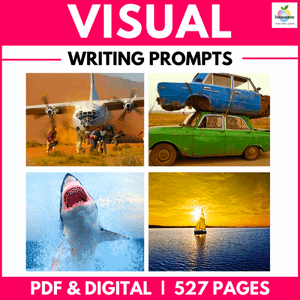
COMPLETE LETTER WRITING UNIT FOR STUDENTS
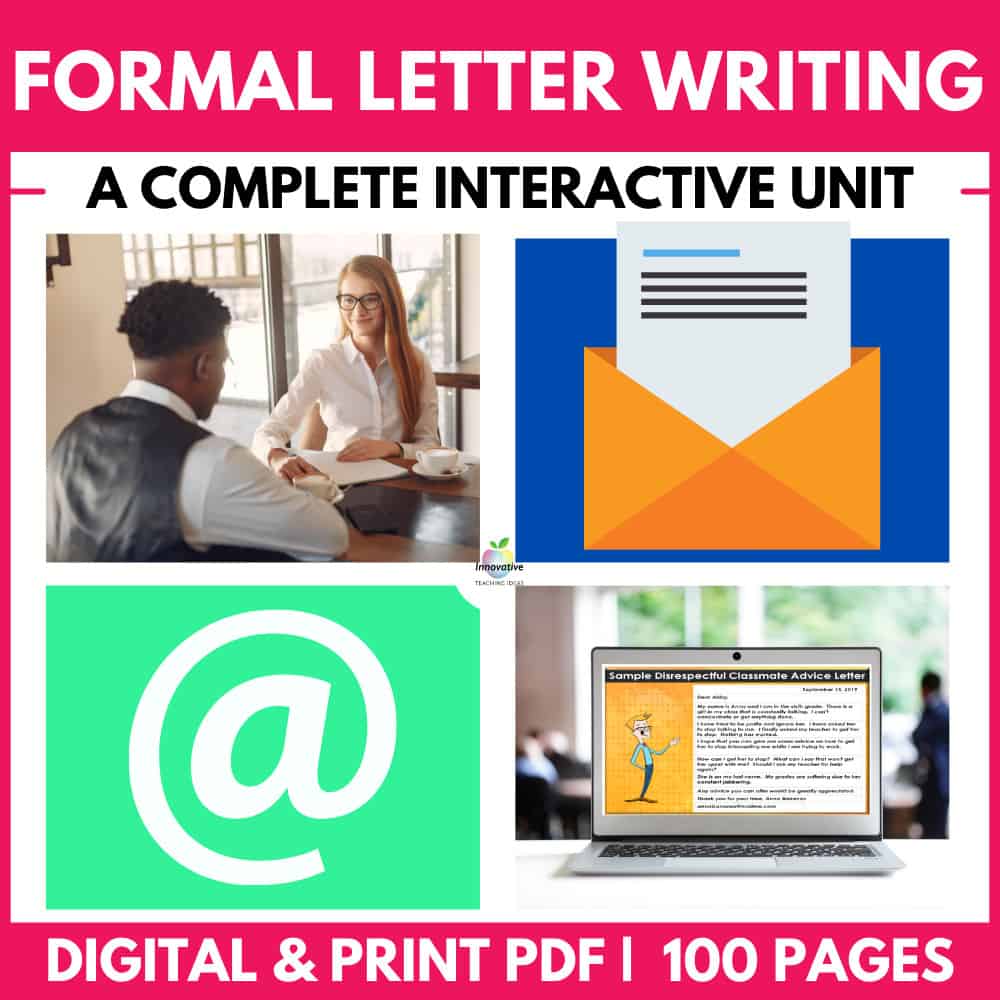
Over 100 PAGES of engaging RESOURCES , various letter SAMPLES , LESSON PLANS and INTERACTIVE DIGITAL RESOURCES to teach your students how to write amazing LETTERS and EMAILS .
Teach this life skill with confidence through this excellent ALL-IN-ONE RESOURCE . No preparation is required.
3 REASONS TO TEACH LETTER WRITING
1. the personal touch: .

Those of us who grew up in an age before the internet got going will remember the excitement of waiting for and receiving a letter. Many of us will have had childhood pen pals we never met or received love letters from our teenage sweethearts. Maybe some treasured letters are still securely stored in a bedside drawer.
There is something extremely personal and intimate about the letter that email cannot capture. Letters are physical, and their increasing rarity makes them seem even more intimate today.
In this day and age, receiving a personally written letter is something a unicorn in communication terms. Students who know how to produce a well-crafted letter can use it to their advantage. For example, any business hiring manager will undoubtedly be numbed by the constant torrent of emails flooding their inbox.
That mailed resume accompanied by a handwritten letter that waits for them on their desk in the morning will surely stand out and secure an attentive read. The letter, in its various forms, is guaranteed to stand out and make an impact in an age where the vast majority of communication is digital.
3. Handwriting

Just as letter writing has declined in popularity, so too has the emphasis on well-developed handwriting skills. You can, if you wish, take the opportunity here to have the students work on their handwriting skills.
While students may protest that they can accomplish the task much quicker by word-processing, another benefit of handwriting a letter is that the speed becomes almost meditative. This allows students to focus carefully on their grammar and punctuation without always resorting to the crutch of spell-checkers and grammar correction software.
FORMAL AND INFORMAL LETTER WRITING: WHAT’S THE DIFFERENCE?
The table below outlines whether your letter should be written formally or informally, with some suggested prompts . Whilst there are many similarities, a formal letter should always be considered as a document with a real purpose and ramifications.
FORMAL LETTER FEATURES
USED FOR PROFESSIONAL COMMUNICATION THESE DOCUMENTS FOLLOW A PRESCRIBED FORMAT. THEY ARE WRITTEN IN A PASSIVE VOICE FOR A SPECIFIC PURPOSE AND IN MANY CASES ARE LEGALLY BINDING. SOME EXAMPLES ARE.
INVITATION Make someone feel special about an upcoming event.
APPLICATION Write a professional letter of application for a job or group you wish to join.
REFEREE / REFERENCE Vouch for another’s skills, personality or credibility.
ACCEPTANCE & REJECTION Approve or deny an applicant in a professional manner.
MAKE AN OFFER Make a formal and binding offer in writing.
EXIT / RESIGNATION Formally leave or step down in a professional and dignified manner.
INFORMAL LETTER FEATURES
USED FOR PERSONAL COMMUNICATION THESE LETTERS HAVE NO PRESCRIBED FORMAT AND ARE WRITTEN IN AN ACTIVE VOICE.
THANK YOU Let someone know you appreciate their efforts.
CONGRATULATIONS Acknowledge someone’s achievements in life.
GRIEVANCE / LOSS Acknowledge someones personal loss or suffering and let them know you care.
FRIENDSHIP & LOVE Tell someone how special they are to you and why?
LETTER TO THE EDITOR / MAYOR ETC. Let someone know how their actions and adversely affect you and others.
LETTER TO SELF Give your older or younger self some words of advice and wisdom.
INFORMATIONAL UPDATE Write a letter back home telling them what you have been up to.
HOW TO WRITE FORMAL LETTERS
The writing process begins with planning.
As with all genres of writing, the process of formal letter writing should start with planning. This should involve sketching a brief outline from which to work rather than a comprehensive detailing of minutiae. The plan should include:
- Note addresses, names etc. – who are you writing to?
- Record the purpose of the letter – what do you want to say?
- List points to be made (each will form a paragraph) – how will you say it?
- State action point – what do you want the reader to do?
Formal letters can be written for a wide range of purposes and may come in various shapes, including a letter of complaint, a cover letter accompanying a job application, a letter of invitation, a reference letter, or a proposal letter – to name a few. Though each will adhere to its own rules of formatting and tone when writing formal letters, students should avoid using slang or contractions.
Language should be straightforward and polite. Encourage students to avoid bursts of purple prose in favor of direct, functional language. Usually, a formal letter will be written to achieve a particular end and should be written with that end foremost in mind. Students should avoid meanderings and stay firmly focused on the task at hand.
TIPS FOR WRITING GREAT FORMAL LETTERS

- The writer’s address should be in the top right-hand corner.
- The date should be written below the writer’s address
- The recipient’s name and address are below that on the left-hand side
- Use the correct opening (Dear Sir / Madam, Dear Mrs Ferguson, etc.)
- Use Standard English
- The opening sentence should explain the purpose of the letter
- Each paragraph should make a single specific point
- Use an appropriate formal tone and register in the wording of the letter
- Avoid contractions, slang, and abbreviations
- The concluding ‘action point’ paragraph states what you want the recipient to do
- The formal ending, such as Yours Sincerely or Yours Faithfully
A Note on Salutations
If the student knows the intended recipient’s name, start with Dear Mr. / Mrs Surname and end with Yours Sincerely. If they don’t know the recipient’s name, start with Dear Sir / Madam and end with Yours Faithfully.
Use of Rhetorical Devices
As mentioned, formal letter writing focuses on attempting to convince someone to take some course of action or other. To do this, it is helpful to employ some rhetorical devices to make the writing more persuasive . Some useful techniques to encourage your students to employ include:
Direct Address: Using the pronoun ‘you’ in a formal letter makes the reader feel that you are speaking directly to them. This helps to engage the reader and encourage them to continue reading the letter.

Emotive Language: Where students are trying to convince the reader to take a course of action, the use of emotive language can often be a powerful tool. Students can use either positive or negative colored words to create the desired response in the reader.
Facts and Figures: Another way to persuade and convince is to employ facts and figures to support the points made in the letter.
FORMAL LETTER STUDENT EXAMPLES

How to write an informal letter
Common features of informal letters:.
There are far fewer rules to follow when writing an informal letter, but there are still some practical guidelines to follow that will prove helpful for students engaged in writing informally.
As with any piece of writing, it is important to consider who the audience is and the reason for writing in the first place. In particular, this will help decide the tone and the language register. The more intimate the relationship, the more informal the language can be.
Though the letter will be informal, it will still have a purpose. Information should still be organized into paragraphs, as would be done with a formal, more ‘official’ letter. Students sometimes struggle with this aspect, as they often conflate ‘informal’ with ‘disorganized.’ Making them plan their informal letter before writing can help ensure it is sufficiently organized.
HOW TO START AN INFORMAL LETTER
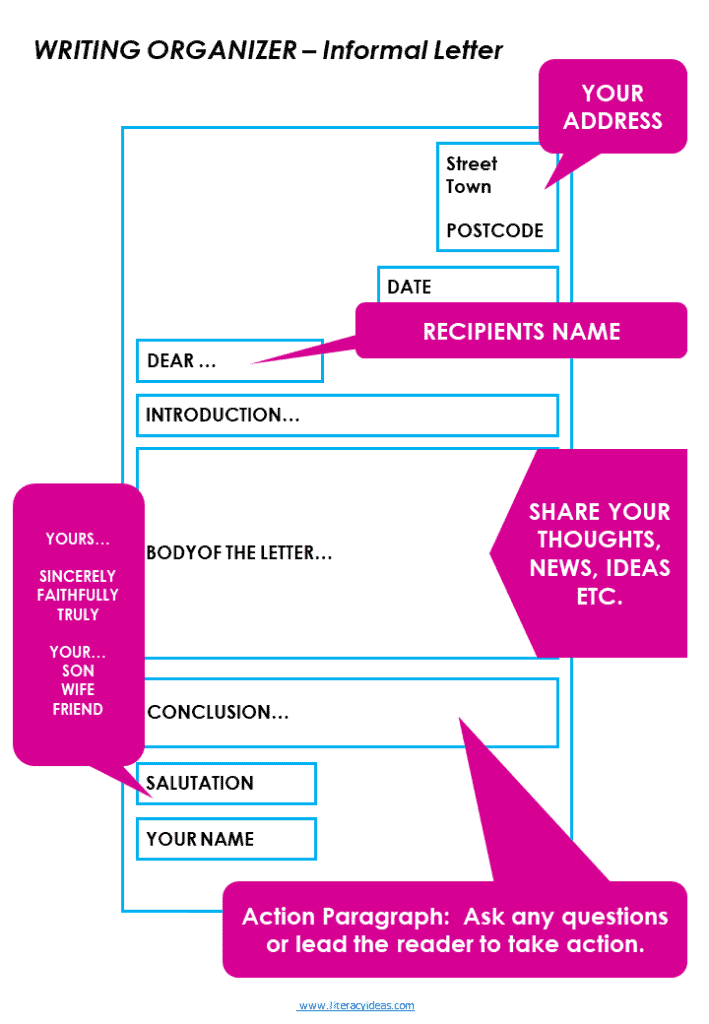
Informal letters will start with a greeting appropriate to how close the relationship is. For acquaintances, this may be ‘Dear Tom,’ (using the first name instead of the surname) to a very informal ‘Hi Jane,’. Don’t forget the comma after the name!
After the greeting, a general opening sentence should follow. Usually, this will be something like a ‘How are you?’ or a ‘How have you been?’. If the recipient is married or has kids, you may wish to ask how their spouse or children are.
Next, students should state the reason for writing. The language should be open and friendly in tone and, in contrast to the formal letter, colloquial language, idiomatic expressions, and contractions are perfectly okay and even desirable.
Just as the opening salutation to an informal letter is much more relaxed, so too will the closing salutation. There are many possibilities for the students to choose here, and their decision will depend on who they are writing to and their personal preferences. Some examples of possible closings include ‘Love’, ‘Best regards’, ‘All the best’, and ‘Thanks’.
INFORMAL LETTER STUDENT EXAMPLES

Teaching Resources
Use our resources and tools to improve your student’s writing skills through proven teaching strategies.
PRACTICE LETTER WRITING WITH THESE ACTIVITIES FOR STUDENTS
The most effective way for students to internalize all the features of letter writing, formal or informal, is to gain experience by writing various letters for differing purposes. The following activities offer some suggestions for students to get practising today:
1. FICTION AS A SPRINGBOARD
Have students write as if they were a character from a piece of fiction you have been reading in class. Choosing a dramatic point in the plot , ask students to imagine they are one of the characters writing a letter to another character in the story. This writer may be either formal or informal, depending on the scenario presented. This will give students realistic letter-writing practice while also getting them to engage closely with the text and respond imaginatively to its themes.
2. THE AGONY AUNT
Either offer a range of possible life predicaments or cut out the questions from the ‘agony aunt’ page of a local newspaper. Students must write back offering advice in response to the predicaments expressed in the question or predicament. The response should be written in full letter format. This activity also lends itself to several variations. The response may be written to a close friend, for example, or written from the perspective of a professional agony aunt employing a more formal tone and presentation.
3. A LETTER OF COMPLAINT
Have students think of their favorite candy bar or clothing item. Encourage them to imagine they have bought this product lately and found it to be substandard. Students must write a formal letter of complaint to the manufacturer outlining their complaint and recommending a course of action to satisfactorily resolve that complaint. They must use all the features of a formal letter as outlined above.

HOW TO MAKE YOUR HANDWRITTEN LETTERS LOOK OLD AND AUTHENTIC.
- Write in pencil or a calligraphy pen,
- screw them up tightly and carefully unfold and flatten.
- Lightly dab coffee stains over the paper to make it look aged.
- Carefully singe or burn the edges of your paper.
- Add some sepia-filtered photos for effect.
SIGNING-OFF
As students become more confident in their understanding of letter-writing formats, encourage them to exchange letters with each other for peer assessment. You may wish to provide them with a checklist of features to look for while reading over their partner’s work.
Letter-writing can also be a great way to partner up with schools overseas; often, children studying English as a second language will be delighted to receive letters from (and write to) students in English-speaking countries. And though email increasingly encroaches on the traditional territory of the letter, many of the skills garnered in the practice of letter writing are transferable to the modern manifestation. There is ample opportunity here to link letter-writing learning with approaches to writing emails too.
Letter-writing can provide a focus for a wide range of learning objectives while also teaching students valuable practical skills that will serve them well beyond their school years, both in their personal and work lives. And who knows, perhaps in years to come, one of the letters your student writes in your class may become a treasured keepsake in someone’s bedside drawer.
LETTER WRITING GRAPHIC ORGANIZERS (TEMPLATES)
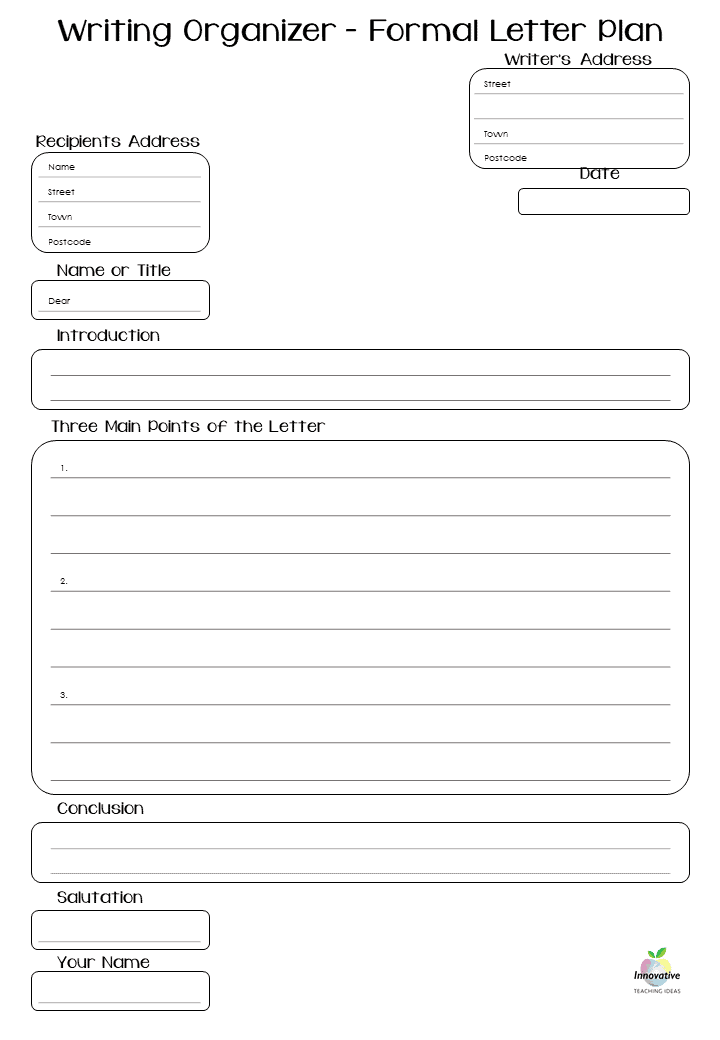
WRITING CHECKLIST & RUBRIC BUNDLE FOR ALL TEXT TYPES

HOW TO WRITE A FORMAL LETTER TUTORIAL VIDEO
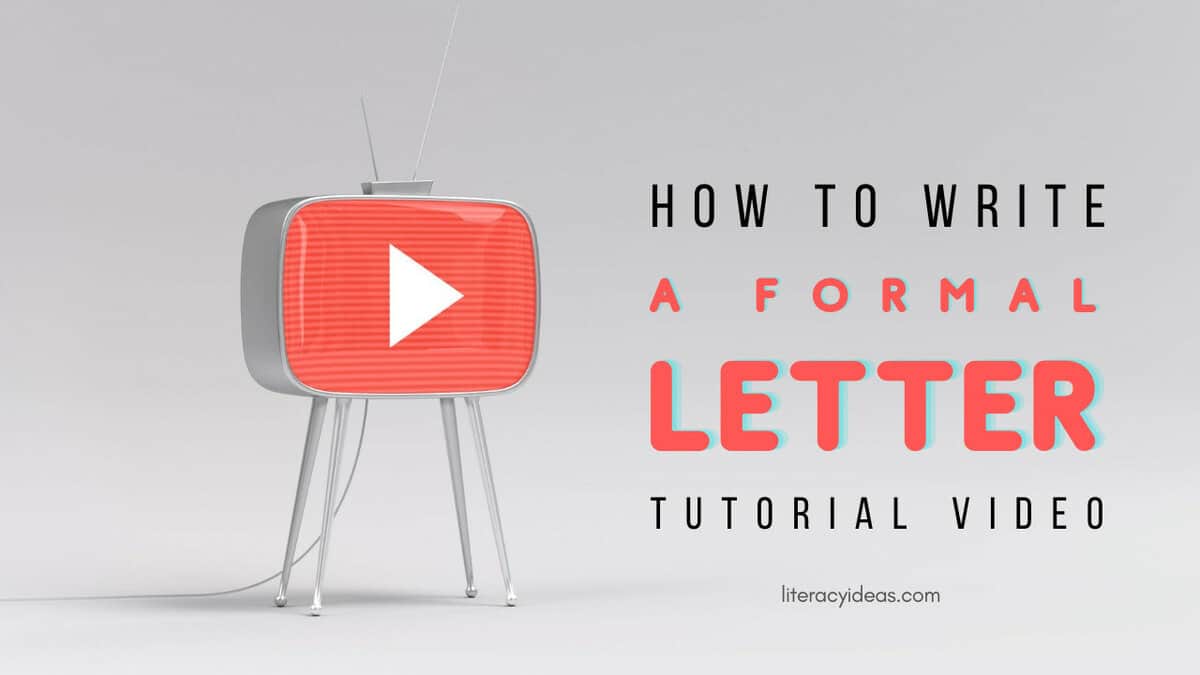
OTHER GREAT ARTICLES RELATED TO LETTER WRITING
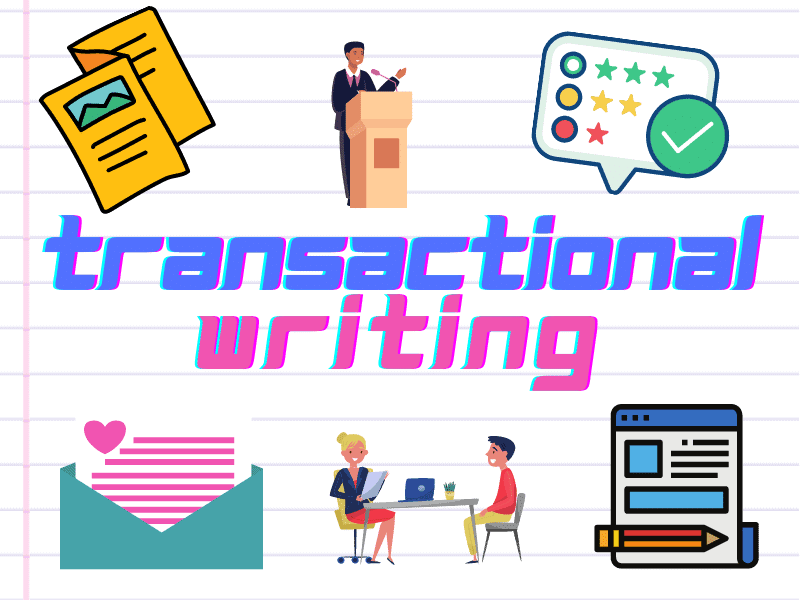
Transactional Writing
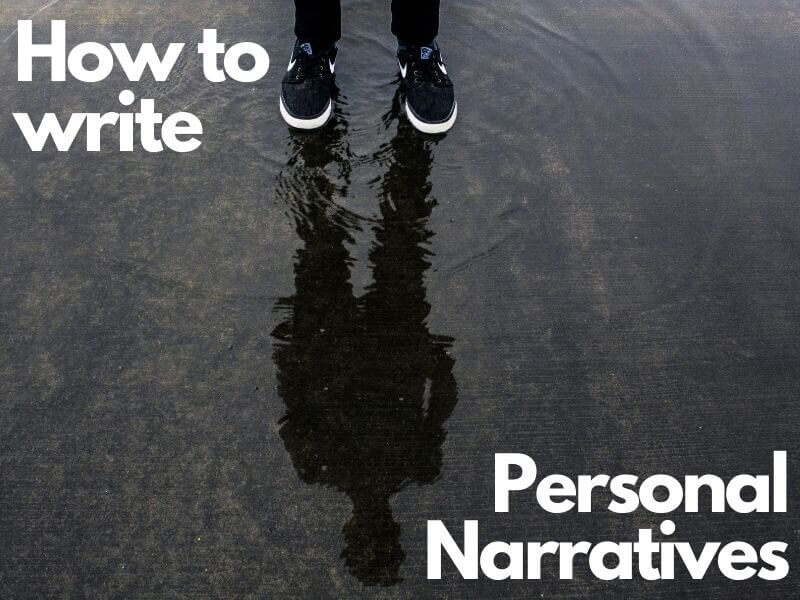
Personal Narrative Writing Guide

How to Write a Recount Text (And Improve your Writing Skills)
Content for this page has been written by Shane Mac Donnchaidh. A former principal of an international school and university English lecturer with 15 years of teaching and administration experience. Editing and support content has been provided by the literacyideas team.

Essay Cover Letter
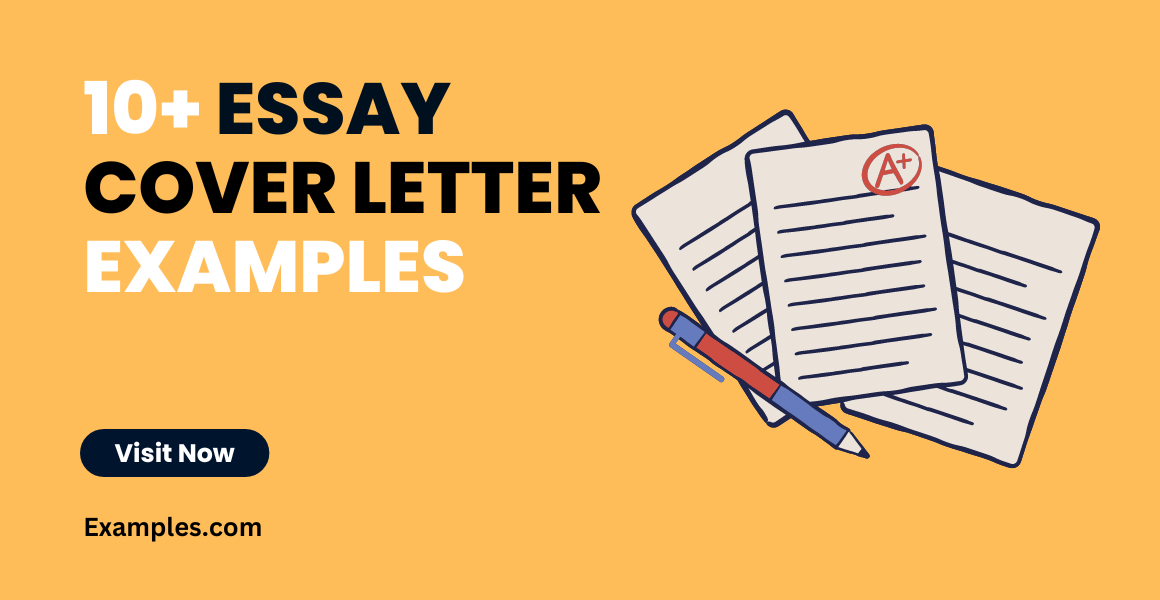
An Essay Cover Letter is more than a formality; it’s an opportunity to impress. Whether you’re submitting an academic essay or looking for a publication opportunity, the cover letter serves as your first impression. This article sheds light on what an Essay Cover Letter is, provides insightful examples, and offers valuable tips to make your cover letter stand out.
What is an Essay Cover Letter?
An Essay Cover Letter is a brief introduction accompanying an essay, typically submitted to an academic institution or a publication. It summarizes the content and purpose of the essay, highlights the writer’s qualifications, and expresses the intention behind submitting the essay. It’s a personalized note that connects the reader to the writer, setting the tone for the content that follows.
What is an Example of an Essay Cover Letter?
Here’s an generic cover letter example for an Essay Cover Letter tailored for an academic submission:
[Your Name] [Your Address] [City, State ZIP Code] [Email Address] [Phone Number] [Date]
[Professor’s Name] [Department] [University Name] [University Address] [City, State ZIP Code]
Dear [Professor’s Name],
I am submitting my essay entitled “[Title of the Essay]” for consideration in your [Course Name] class. This essay explores [Brief Summary of the Essay Content], drawing on [Methodology or Sources Used].
As a student majoring in [Your Major], I have thoroughly researched the subject matter and applied critical thinking skills to provide a comprehensive analysis of [Specific Topic]. I believe this essay aligns with the course objectives and will contribute valuable insights to the class discussions.
Please find the essay attached for your review. I look forward to receiving your feedback and am available for any questions or further clarification.
Thank you for considering my submission.
[Your Signature]
[Your Full Name] [Student ID]
This example outlines the essential elements of an effective Essay Cover Letter, maintaining a formal tone and providing specific details about the essay and the writer’s qualifications.
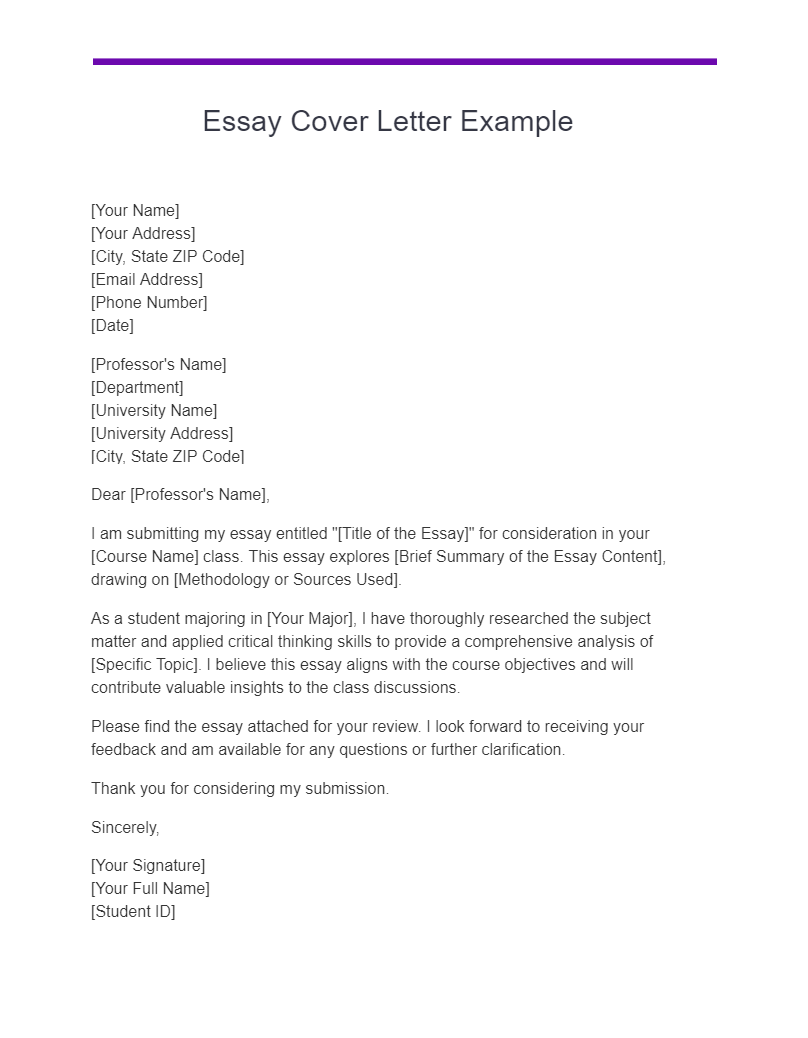
Size: 26 KB
Free Essay Cover Letters – Copy & Paste
Essay cover letter format.
This example represents the standard format that an Essay Cover Letter should follow. The below template can be customized according to your needs.
[Your Full Name] [Address] [City, State, ZIP Code] [Phone Number] [Email Address] [Date]
[Recipient’s Full Name] [Recipient’s Title] [Organization/University Name] [Address] [City, State, ZIP Code]
Dear [Recipient’s Name],
[Opening Paragraph: Introduction and reason for writing]
[Body Paragraph(s): Details about the essay, your qualifications, and why your essay fits the context]
[Closing Paragraph: Thank you note and contact information]
[Signature (if printed)] [Typed Full Name]
Customize the bracketed sections with your specific details. Make sure to include an introduction, details about the essay, and a closing thank you note.
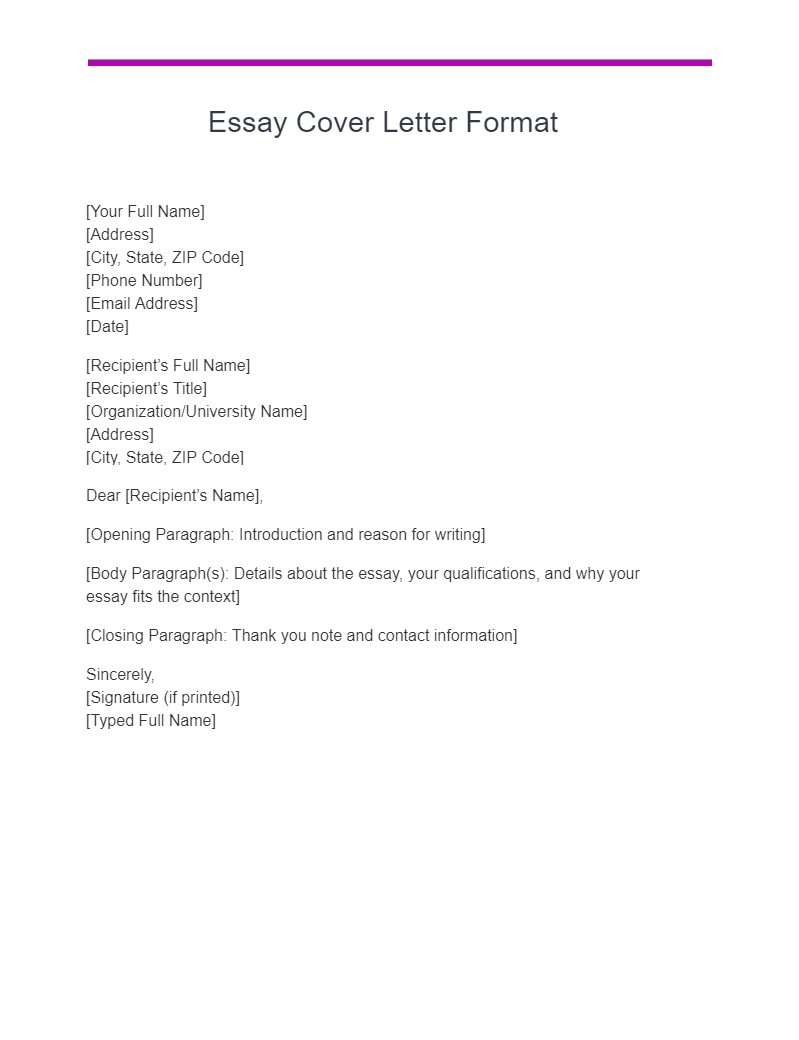
Sample Essay Cover Letter Example
This is a good cover letter sample that can be adapted to any essay submission.
Dear [Recipient’s Name],
I am writing to submit my essay titled “[Essay Title]” for [Purpose of Submission]. My essay explores [Topic], and I believe it offers a fresh perspective on [Specific Aspect].
[Body Paragraph detailing the approach, sources, and relevance of the essay]
Thank you for considering my work. I look forward to your feedback.
Best Regards, [Your Name]
This sample is adaptable. Fill in the brackets with specific details about your essay and the submission context.
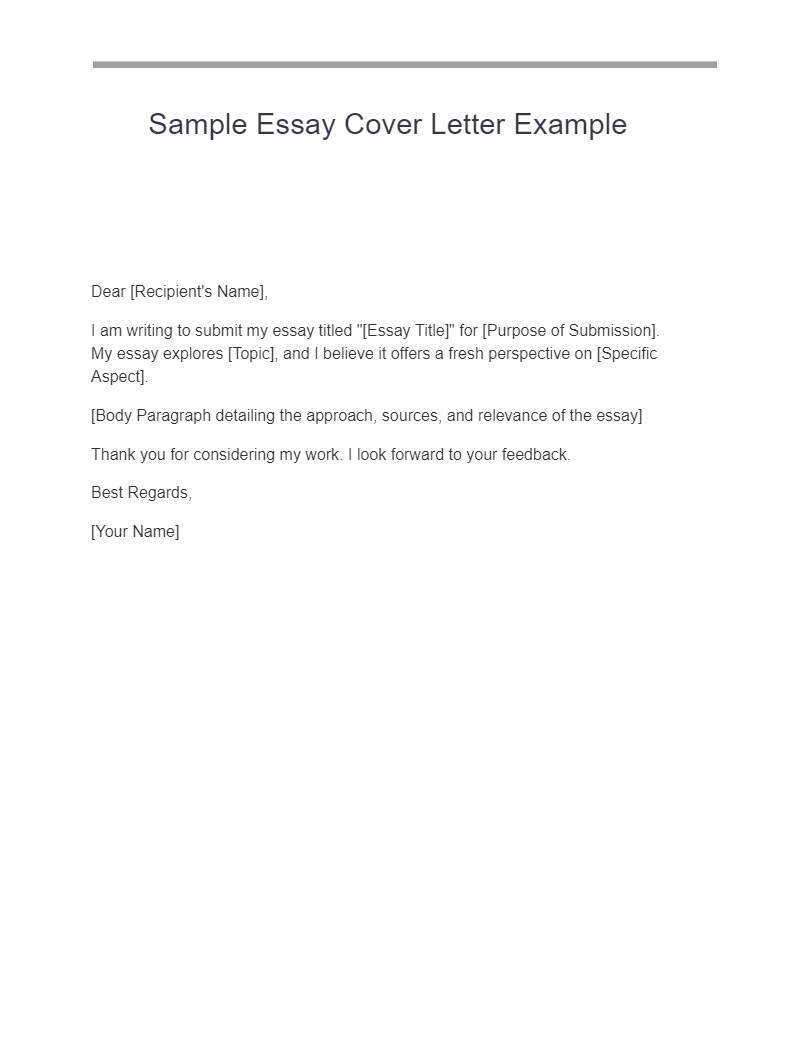
Size: 25 KB
Short Essay Cover Letter
Ideal for submissions with a strict word count limit.
Enclosed is my essay “[Essay Title],” written for [Purpose]. It delves into [Topic], and I hope it contributes to [Specific Field or Discussion].
Thank you, [Your Name]
This short version is perfect when brevity is required. It gets straight to the point but remains polite and professional.
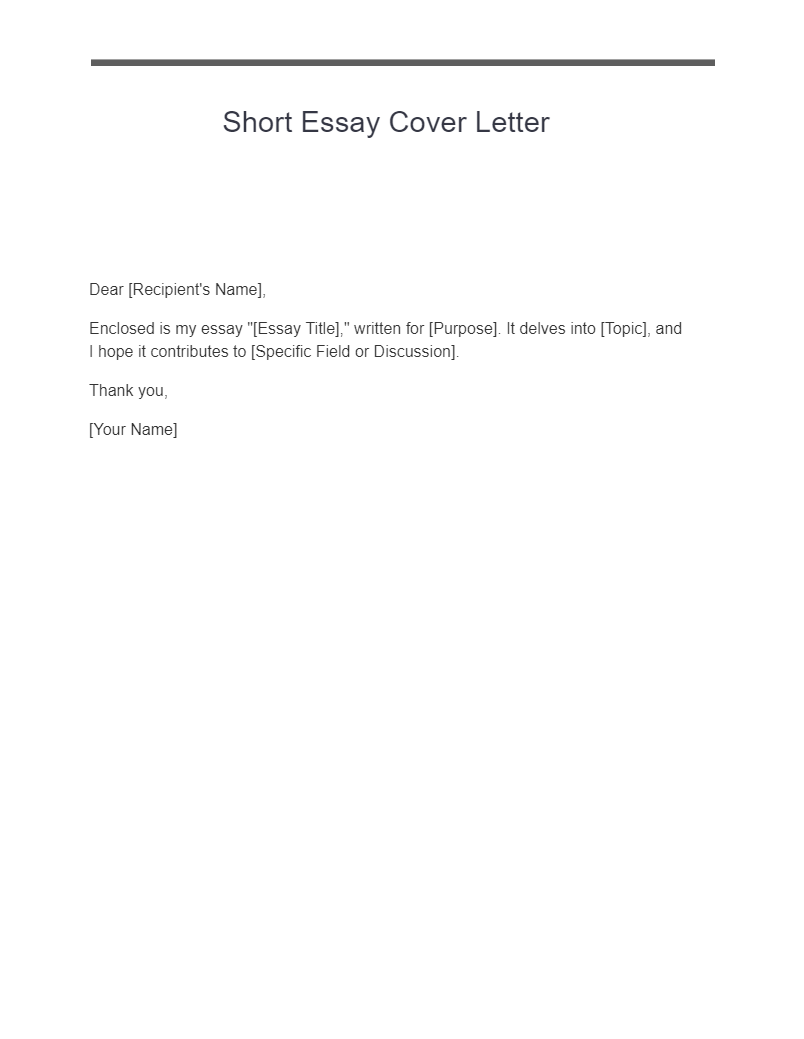
Size: 22 KB
Essay Cover Letter for College Student Example
Specifically designed cover letter for college students submitting essays for class or applications.
[Your Name] [College] [Address] [City, State ZIP Code] [Date]
[Professor’s Name] [Department] [College] [Address] [City, State ZIP Code]
I’m submitting my essay on [Subject] for your [Course Name]. As a [Major] student, I found this topic particularly intriguing because [Reason].
[Details about the essay and any specific request for feedback]
Thank you for your consideration.
Sincerely, [Your Name] [Student ID]
Customize this template to reflect the course details, your major, and specifics about your essay. It maintains a tone suitable for academic correspondence.
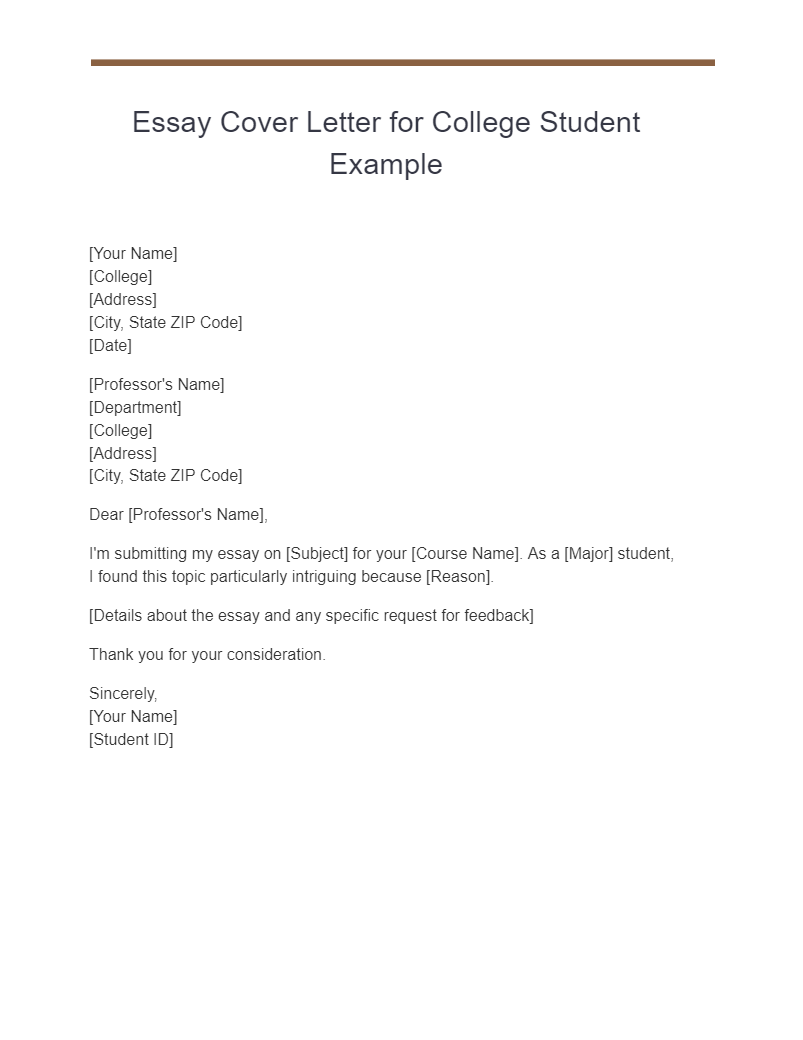
Size: 24 KB
MLA Style Essay Cover Letter Example
For submissions requiring MLA citation style.
[Your Name] [Professor’s Name] [Course] [Date]
[Title of Essay]
[Essay Introduction]
Sincerely, [Your Name]
This template is formatted according to the MLA style and should be used for submissions requiring this citation method.
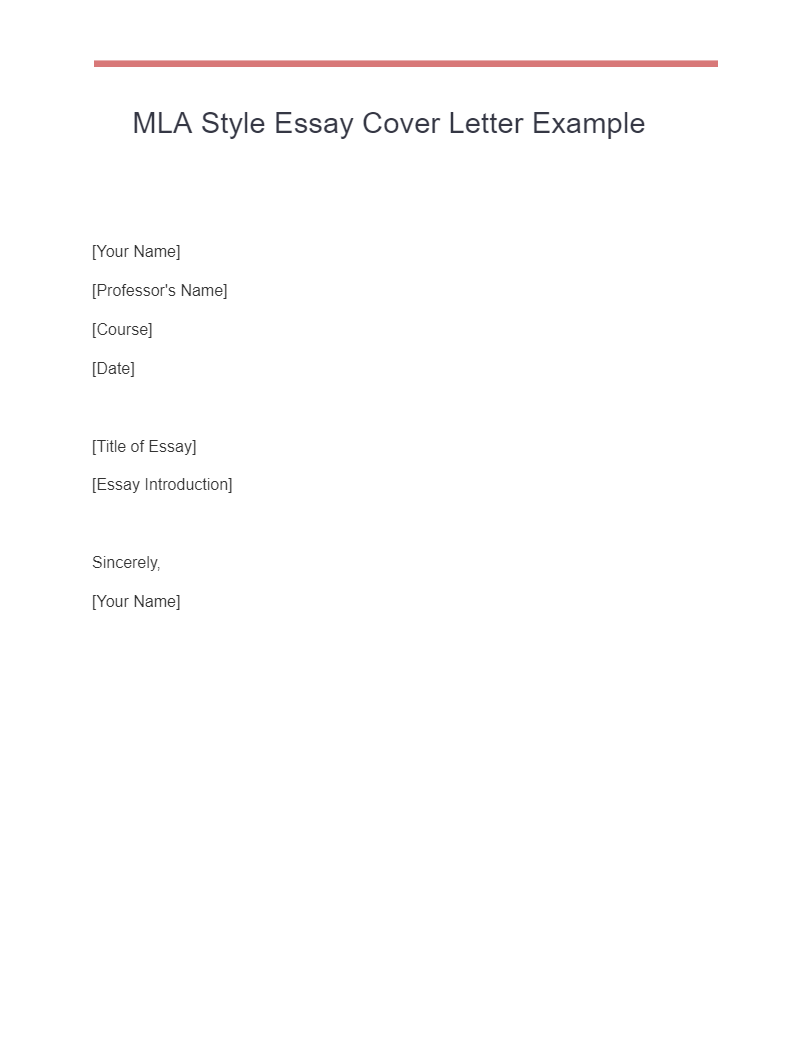
Size: 21 KB
APA Style Essay Cover Letter Example
This is suitable for submissions that require APA formatting.
[Your Name] [Institution] [Address] [City, State ZIP Code] [Date]
[Recipient’s Name] [Title] [Organization] [Address] [City, State ZIP Code]
I am submitting my essay titled “[Essay Title],” written in accordance with the APA citation style, for [Purpose].
[Body Paragraphs detailing the essay, its relevance, and your qualifications]
Use this template for submissions that require adherence to the APA citation style.
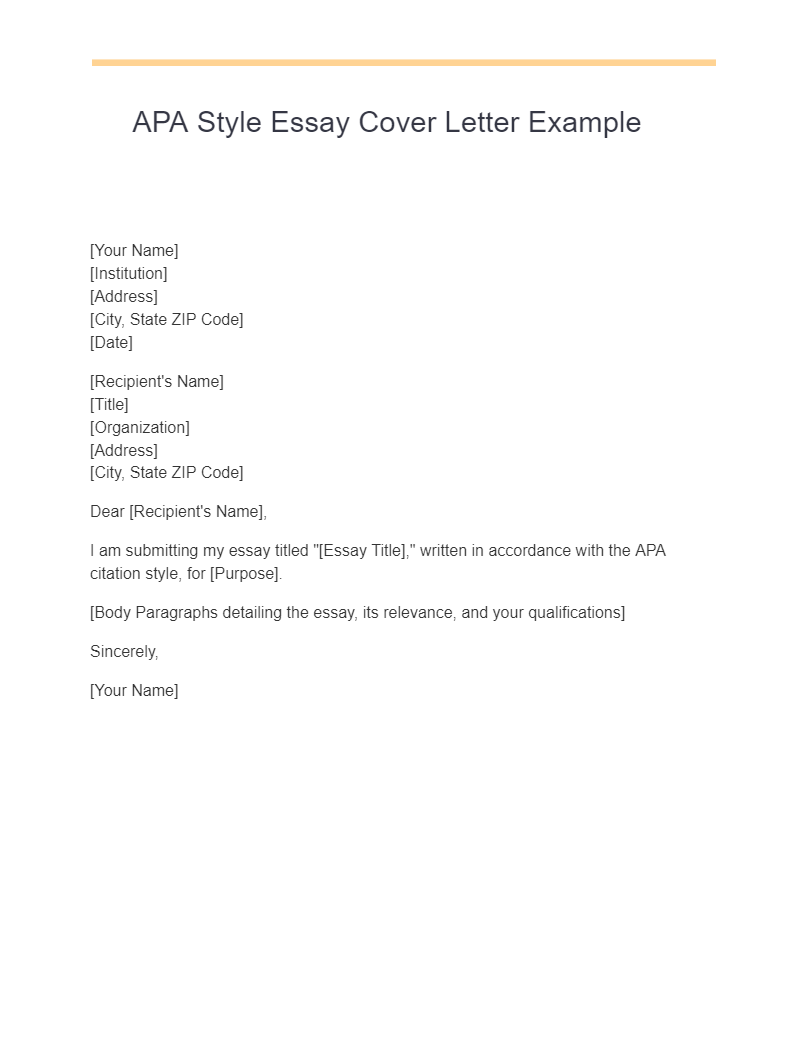
Simple Essay Cover Letter Example
This is a minimalist version suitable for any essay submission.
I’m submitting my essay “[Essay Title]” for [Purpose]. It examines [Topic] through [Methodology/Approach].
This simple version is versatile and can be used for various submission contexts.
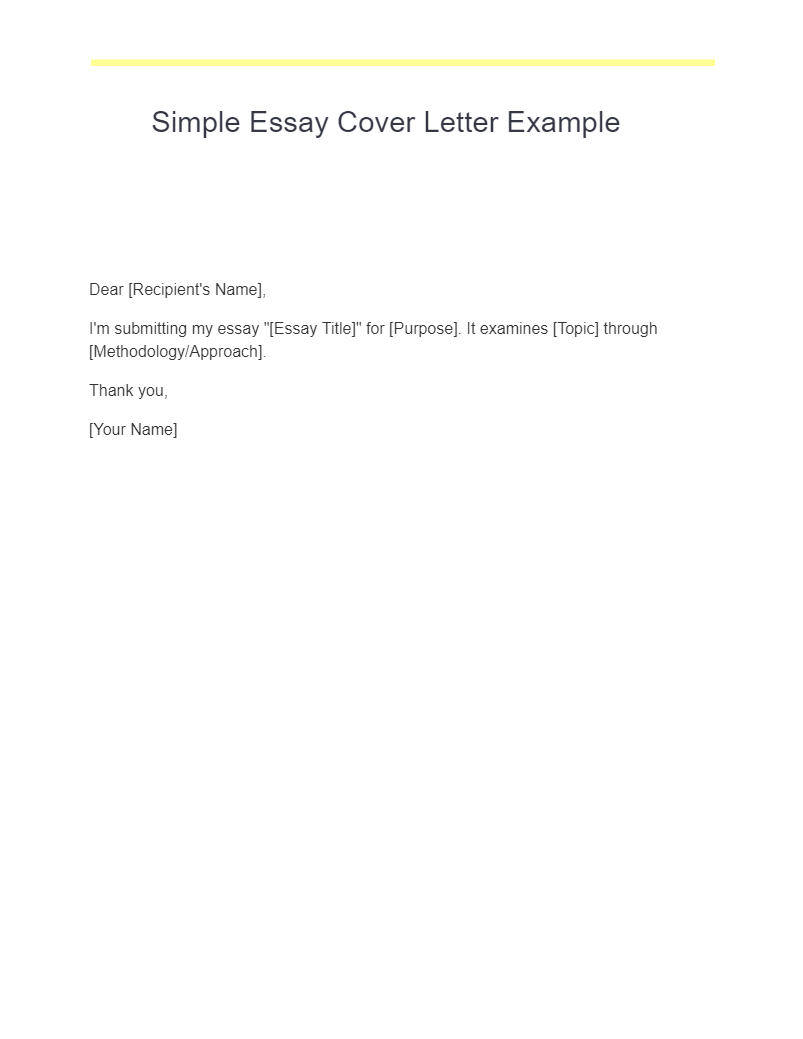
Size: 23 KB
Basic Essay Cover Letter Example
Another minimalist & basic cover letter template, focused on academic submissions.
[Your Name] [Address] [City, State ZIP Code] [Date]
Attached is my essay for your [Course Name], titled “[Essay Title].”
This basic format is tailored to academic submissions and maintains a formal tone.
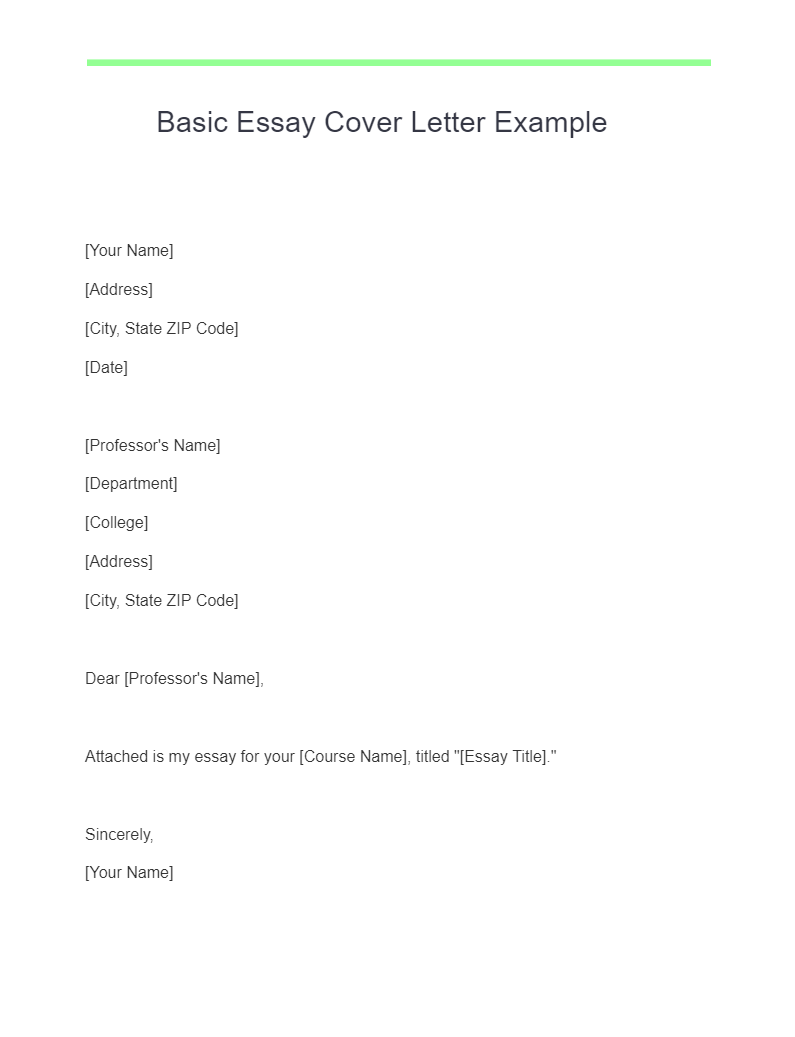
Essay Cover Letter for Admission Example
Ideal for students submitting essays as part of a college application.
[Your Name] [Address] [City, State ZIP Code] [Phone Number] [Email Address] [Date]
[Admission Officer’s Name] [College/University Name] [Address] [City, State ZIP Code]
Dear [Admission Officer’s Name],
I’m thrilled to submit my essay for consideration as part of my application to [College/University Name]. My essay, titled “[Essay Title],” reflects my passion for [Field of Study] and my commitment to [College/University Values or Goals].
[More details about the essay, your qualifications, and why you chose this particular institution]
Thank you for considering my application.
Sincerely, [Your Signature] [Your Full Name]
This template can be tailored to the specific college or university application, highlighting your alignment with the institution’s values or goals.
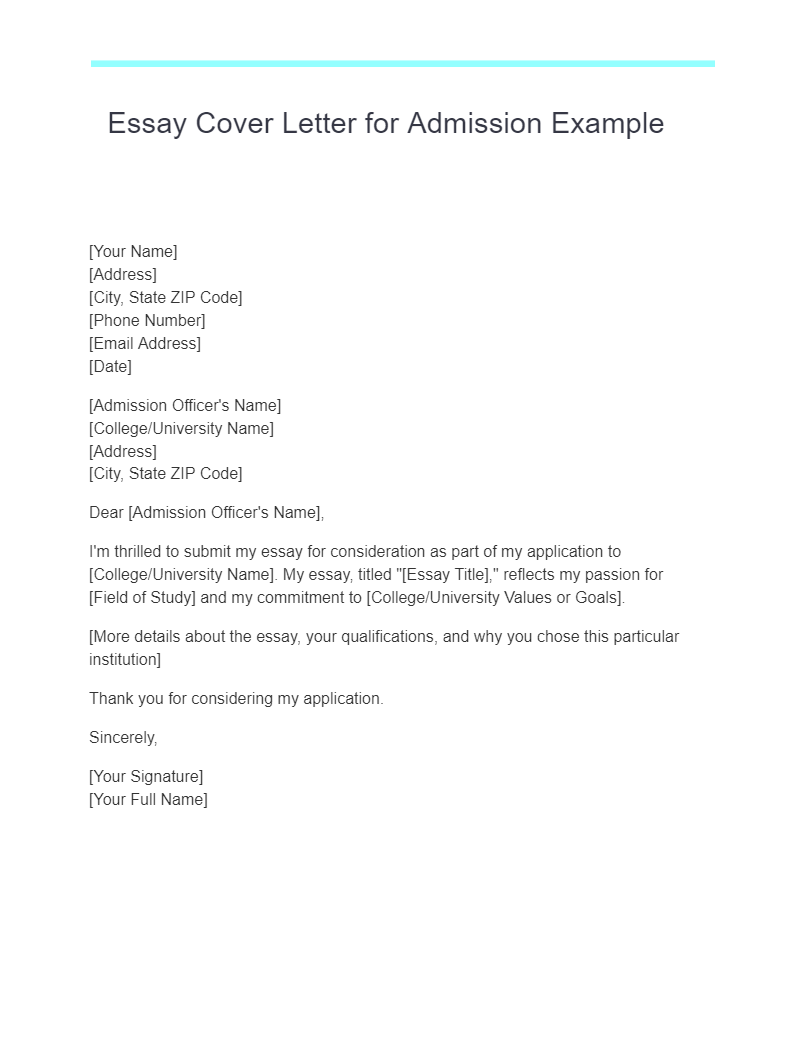
Persuasive Essay Cover Letter Example
For submitting persuasive essays specifically.
I am submitting my persuasive essay titled “[Essay Title].” This piece aims to convince readers about [Argument/Thesis] and is supported by [Evidence/Methodology].
[Further details about the essay, its relevance, and your qualifications]
Use this template when submitting a persuasive essay, emphasizing the argument and evidence.
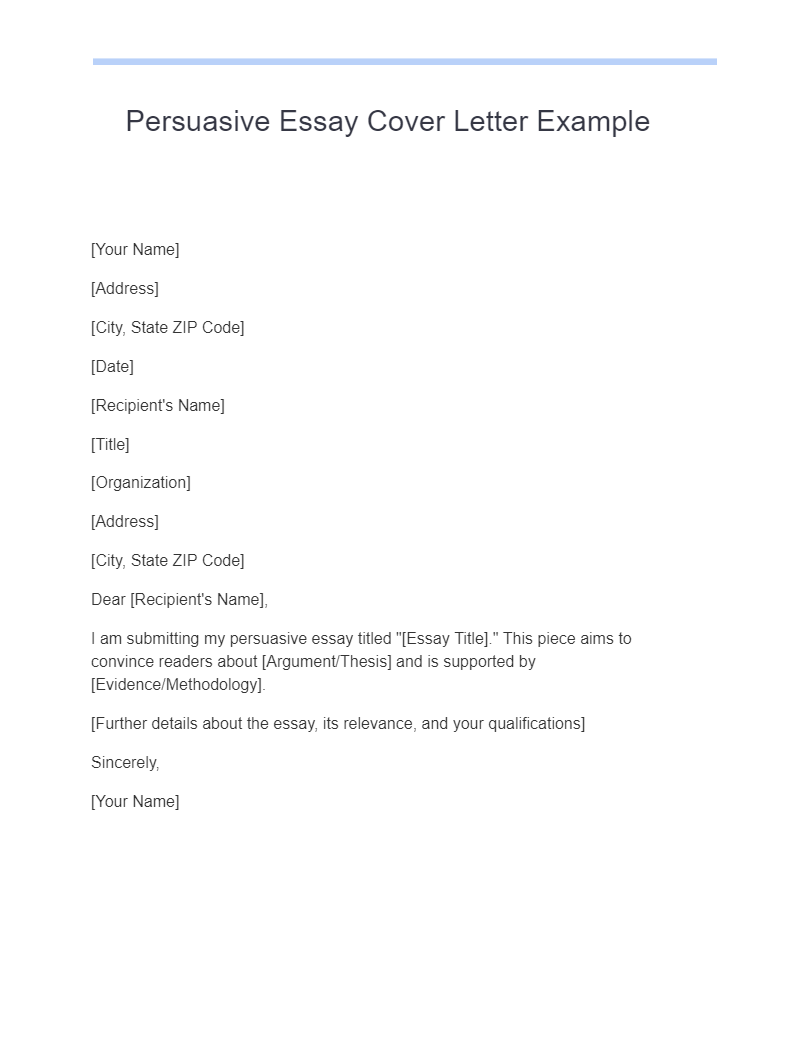
History Essay Cover Letter Example
For history-related essays and submissions.
[Professor/Recipient’s Name] [Title/Department] [Institution/Organization] [Address] [City, State ZIP Code]
Dear [Professor/Recipient’s Name],
I am submitting my historical analysis titled “[Essay Title].” Drawing from primary sources, this essay explores [Historical Event or Period], offering new insights into [Specific Aspect or Perspective].
[More details about the essay, its relevance to the field of history, and your qualifications]
This template is tailored to history essays, with emphasis on the sources and historical analysis.
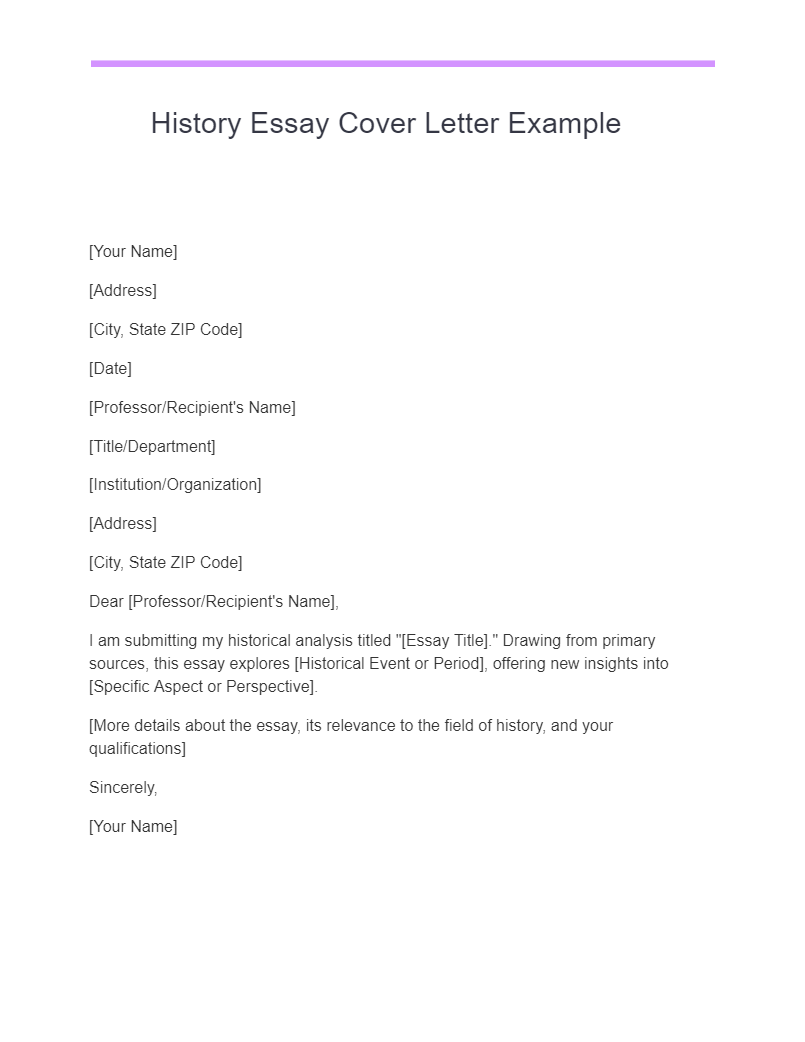
Size: 266 KB
Research Paper Cover Letter Example
This Research Paper cover letter is Ideal for research paper submissions to journals or academic conferences.
[Your Name] [Title] [Institution] [Address] [City, State ZIP Code] [Date]
[Editor’s Name] [Journal Name] [Address] [City, State ZIP Code]
Dear [Editor’s Name],
I am submitting my research paper titled “[Paper Title]” for consideration in [Journal Name]. My research focuses on [Research Area], and I believe it offers significant contributions to the field.
[Further details about the research, methodology, and relevance to the journal’s readership]
Sincerely, [Your Name] [Your Title] [Contact Information]
Use this template for research paper submissions, making sure to tailor it to the specific journal or conference requirements.
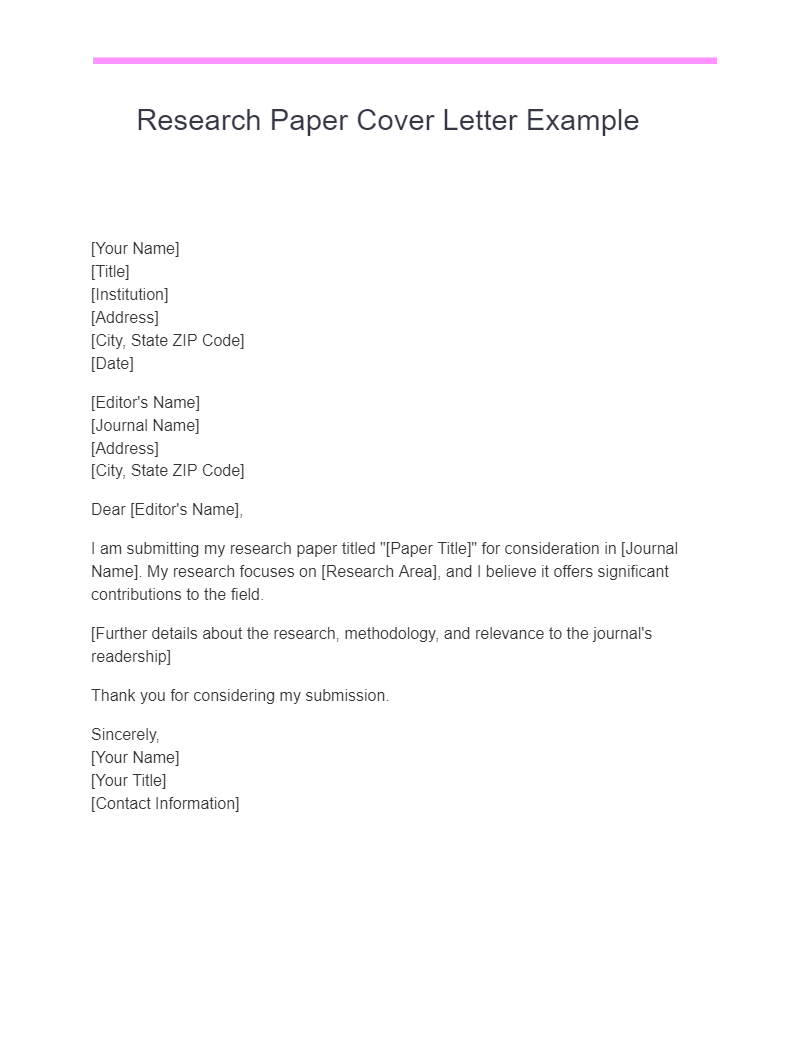
What do you write in an Essay Cover Letter?
An Essay Cover Letter is more than a formality; it’s a chance to present your essay in the best possible light. Here’s what to include:
– Your Contact Information: Always include your full name, address, phone number, and email so the recipient can easily reach you. – Recipient’s Information: Address the cover letter to a specific person, if possible, including their title and address. – Introduction: Briefly introduce yourself, your academic or professional background, and explain the purpose of your essay. – Summary of the Essay: Offer a concise summary of your essay’s main topic, argument, or thesis. Avoid revealing too much, but give the reader a taste of what’s to come. – Relevance: Detail why your essay is relevant to the reader, whether it’s a professor, admissions officer, or publication editor. – Your Qualification and Interest: Share your qualifications or experiences that make you the right person to write this essay, along with why the topic interests you. – A Closing Statement: Express gratitude for the reader’s time and consideration, and include information on how they can contact you. – Signature: Include a formal closing, followed by your signature (for a hard copy) or typed name (for an email).
How Do You Write a Cover Letter for an Essay?
Writing an Essay Cover Letter requires understanding and careful crafting. Here’s how you can write one:
– Identify the Audience: Know your reader and adjust your tone and content to match their expectations. – Choose the Right Format: Standard letter format works well, but make sure to adhere to any specific guidelines provided. – Write Clearly: Use clear and concise language without oversimplifying your points. – Highlight Key Points: Emphasize the primary arguments or findings without merely repeating the essay. – Express Your Passion and Relevance: Your interest in the topic should shine through, and the relevance of the essay should be clear to the reader. – Edit Thoroughly: Check for grammatical and spelling mistakes, and consider having someone else review it.
Tips for Writing an Essay Cover Letter
– Maintain Consistency: The cover letter’s style and tone should match the essay. – Avoid Redundancy: Don’t repeat the entire essay; summarize and complement it instead. – Use Proper Formatting: If your essay follows APA or MLA guidelines, mirror this in the cover letter. – End Strongly: Conclude with a respectful closing and a clear call to action.
Crafting an Essay Cover Letter is an essential skill that requires attention to detail, a clear understanding of the purpose of the essay, and an ability to connect with the reader. With thoughtful consideration and following these guidelines, you can write a cover letter that not only introduces your essay effectively but also creates a positive initial impression.

Cover Letter Maker
Text prompt
- Instructive
- Professional
Write a cover letter for a college student applying for an internship at an educational technology company
Form a cover letter for a high school student seeking a part-time job at a local bookstore.
- Share full article
Advertisement
Supported by
Student Opinion
To Whom Would You Write an Open Letter?
A politician or a celebrity? A leader of a company? A school administrator? Your mom? Use our questions below to brainstorm ideas for our contest.

By Katherine Schulten and Natalie Proulx
What’s bothering you? Who could do something about it? What could you say that would persuade that person to care or to make change?
And what if we all read your letter? How could you make us care, too?
These are some of the questions we’re asking you to ponder for our new Open Letter Contest . An open letter is a published letter of protest or appeal usually addressed to an individual, group or institution but intended for the general public. Think of the many “Dear Taylor Swift” open letters you can find online and on social media: Sure, they’re written to Ms. Swift, but they’re really a way for the writer to share opinions and feelings on feminism, or ticket sales, or the music industry, or … the list goes on.
We’re inviting you to do this, too. Write your own open letter, to anyone you like on any issue you care about, as long as it is also appropriate and meaningful for a general New York Times audience.
To whom should you write? What should you say?
Take a look at a few examples that have been published in The Times over the years. (In The Times, open letters often appear in the Opinion section since they are persuasive essays written in the form of letters, as you’ll see.)
For instance, sometimes an open letter is intended to call someone out publicly, like this one written to Mark Zuckerberg , the chief executive of Facebook (now Meta), by the screenwriter Aaron Sorkin in 2019. Here is how it begins:
Mark, In 2010, I wrote “The Social Network” and I know you wish I hadn’t. You protested that the film was inaccurate and that Hollywood didn’t understand that some people build things just for the sake of building them. (We do understand that — we do it every day.) I didn’t push back on your public accusation that the movie was a lie because I’d had my say in the theaters, but you and I both know that the screenplay was vetted to within an inch of its life by a team of studio lawyers with one client and one goal: Don’t get sued by Mark Zuckerberg. It was hard not to feel the irony while I was reading excerpts from your recent speech at Georgetown University, in which you defended — on free speech grounds — Facebook’s practice of posting demonstrably false ads from political candidates. I admire your deep belief in free speech. I get a lot of use out of the First Amendment. Most important, it’s a bedrock of our democracy and it needs to be kept strong. But this can’t possibly be the outcome you and I want, to have crazy lies pumped into the water supply that corrupt the most important decisions we make together. Lies that have a very real and incredibly dangerous effect on our elections and our lives and our children’s lives.
But an open letter doesn’t have to be written by someone famous to someone famous. In An Open Letter to the Woman Who Told My Family to Go Back to China (student version; here is the original ), the journalist Michael Luo addresses an anonymous woman on the street. It begins:
Dear Madam: Maybe I should have let it go. Turned the other cheek. We had just gotten out of church, and I was with my family and some friends on the Upper East Side of Manhattan. We were going to lunch, trying to see if there was room in the Korean restaurant down the street. You were in a rush. It was raining. Our stroller and a gaggle of Asians were in your way. But I was, honestly, stunned when you yelled at us from down the block, “Go back to China!”
Open letters can also honor and thank someone, and call attention to the continued importance of their work. In 2017, at the end of Barack Obama’s tenure as president, the rapper T.I. wrote him an open letter :
You entered humbly into our worlds from the streets of the South Side of Chicago and galvanized a generation. You resonated from the barbershops to the airwaves to the streets of every hood across America. Many of US did not know your name, nor did we truly understand the impact you would have on the world in the years, months and days that followed. As I reflect, I am filled with gratitude, outrage, grief, anger, humility and appreciation, both for the things you helped bring to light and the many things we still have yet to realize.
Or they can inspire and motivate, as the columnist Timothy Egan’s letter “ Dear Graduate ,” from 2009, does. Here’s an excerpt:
Eat a hot dog. With lots of mustard. The kind you can get for two dollars from street vendors just outside the ballpark, a trick I picked up from Ash Green, gentleman editor at Alfred A. Knopf. He passed this wisdom on before the recession. While we’re on the subject: Learn to cook, something they don’t teach at fancy-pants colleges. Millions for quantum physics and deconstructing Dostoevsky, nothing on how to make enchiladas for 20 people. At times, your life will have moments, days, even weeks of despair. Trust me: there is no bout of blues that a rich Bolognese sauce, filling every cubic inch of kitchen air, cannot cure. And that brings me to: Take risks. I don’t mean ski the double diamond runs, ask for a card in blackjack with 15 showing and the dealer holding a king, or hit a high note in a karaoke bar, while sober. That goes without saying.
Students, read the open letters above, and then tell us: To whom would you most like to write an open letter?
Here are some questions that can help you brainstorm which audience you might want to address:
Is there someone famous who has made you mad, or has intrigued or impressed you? Or someone to whom you’d like to offer your expertise, advice or opinion? Like a politician, an athlete, a leader of a corporation, an artist or an entertainer?
Is there a powerful person or institution that you’d like to call out publicly? Someone who you believe needs to be held accountable in some way? What have they done that you think others need to know about?
Is there a person or group you would like to inspire or motivate to take action? What is it that you want them to consider, reflect on or do?
Is there someone closer to home, like a parent, a friend, a teacher or a neighbor, you’d like to address? What would you say to this person that would be meaningful, important and appropriate for a general audience to hear?
Is there a person or group you would like to address because you want to honor or thank them or to reflect on their contribution to society, as T.I. did in his letter to Mr. Obama? What has this person or institution done, and what effect has it had on you and others? Why do you think it’s worth acknowledging publicly?
If no one person or group comes to mind, perhaps a cause or issue inspires you.
For a decade we ran an editorial contest , and the students who participated in it wrote passionately about all kinds of things: artificial intelligence , fast fashion , race , transgender rights , college admissions , parental incarceration , fan fiction , snow days , memes , being messy and so much more . You can still write about the issues and ideas that fire you up — but this time around you’ll be writing a letter to a person who has the power to bring change or understanding to that issue. Here are some questions that might help you brainstorm:
What causes or issues do you care about? Why are they important to you? What experiences do you have with them?
What would you like to see change? Why? How would that change be meaningful to you or to the communities you care about?
What do you wish more people understood? What is something you know a great deal about that you think others would benefit from understanding better?
Once you have a sense of your issue, ask yourself:
Who can make a change, big or small, local or global, to address this issue?
In the comments, tell us to whom you’d like to write an open letter, the reason you’re writing and why you think that issue is important not only for the recipient but also for a wider audience.
Then, if you’re so inspired, you can turn your comment into an open letter and submit it to our contest . Find out more about how to write your letter in our related guide .
Students 13 and older in the United States and Britain, and 16 and older elsewhere, are invited to comment. All comments are moderated by the Learning Network staff, but please keep in mind that once your comment is accepted, it will be made public and may appear in print.
Find more Student Opinion questions here. Teachers, check out this guide to learn how you can incorporate these prompts into your classroom.
Katherine Schulten has been a Learning Network editor since 2006. Before that, she spent 19 years in New York City public schools as an English teacher, school-newspaper adviser and literacy coach. More about Katherine Schulten
Natalie Proulx joined The Learning Network as a staff editor in 2017 after working as an English language arts teacher and curriculum writer. More about Natalie Proulx

How To Write a Cover Letter With Examples
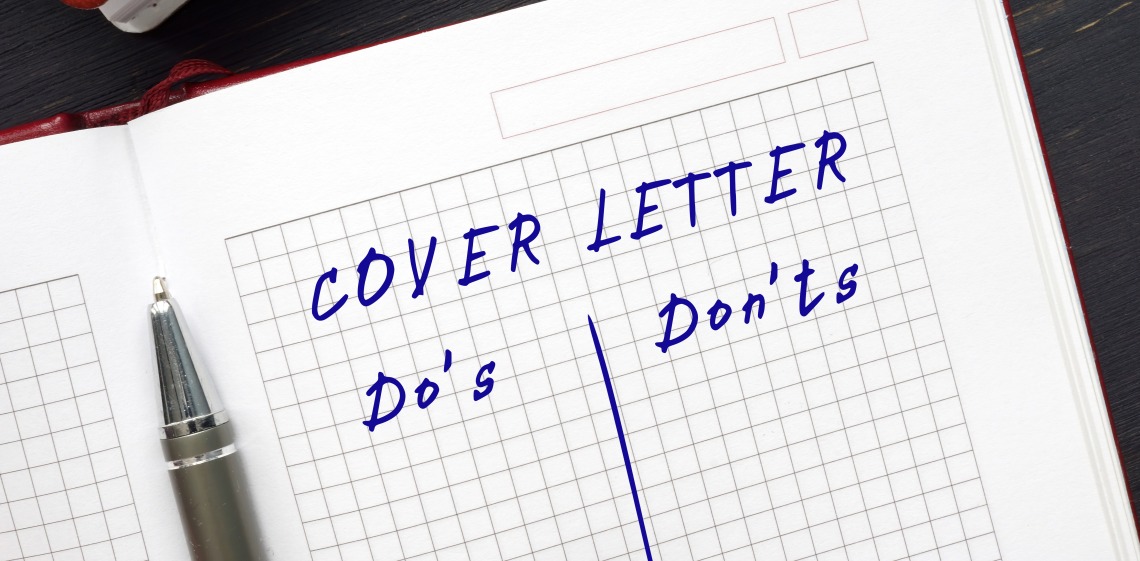
Cover letters can help differentiate you from other job applicants and be the determining factor of landing your dream job. By taking the time to craft a custom cover letter, a single sheet of paper can help communicate all the human elements that a resume may fall short of capturing about yourself.
But what do employers and recruiters have to say about how to write a cover letter? What are the best tips they have to offer for graduate students who are writing a cover letter?
We asked 11 employers for their best cover letter tips. Here is what they had to share.
Let it Set the Stage
In many ways, cover letters should provide background information and context to your resume, while simultaneously addressing how that resume addresses the specific requirements of the job opportunity. The cover letter is your opportunity to "set the stage" and to convince the hiring manager why your specific set of skills, experiences and interests will provide value to their team and its objectives.
Andrew Horrigan '11 BSBA (Management Information Systems), Product Manager at Cisco
Research the Hiring Manager
If possible, find out who the hiring manager is and look them up on LinkedIn. Do your research on the company you're applying for. What's their mission statement and how do they portray their company culture? Hopefully what you're looking for in a job is reflected by those things. Make sure the hiring manager knows that and understands who you are and what drives you. A resume is often about as robotic as things can be. Make sure your cover letter is the opposite—personalize it and let yourself shine through.
Joshua Schlag ’05 BS (Computer Science) ’11 MBA, Digital Marketing Manager at Pyramid Analytics
Utilize Career Development Resources
The University of Arizona and Eller College of Management go to great lengths to make sure students are prepared for their impending career journey. Because cover letters are so important to getting your foot in the door, there are several career development resources online and on campus to take advantage of. The university’s cover letter builder serves as a nice template to get started. And of course, it never hurts to make an appointment with an Eller Career Coach through eSMS to have a professional review your letter before submission.
Brett Farmiloe, ’06 BSBA (Accounting), Founder, Featured
Discover Past Samples of the Position
Do your research on the company and personalize your cover letter to the role for which you are applying. Don't be afraid to Google, "How to write a good cover letter for X position." Seriously, it helps! There is so much information out there from various perspectives—applicants, hiring managers, etc. Most importantly be yourself and let your personality come through. And don't forget to spell check!
Mariam Nikola '17 MS MIS, Consultant at Point B
Highlight Your Soft Skills
When writing a professional cover letter, there are a couple things you can do to set yourself apart from the pack. First, make sure you tailor your letter to the specific position you are applying for. This should not be a general, "one size fits all" letter—be sure to discuss specific details surrounding the role or the company itself. Secondly, this is an opportunity for you to show a little bit of your personality. Obviously, you want to remain professional, but this is a great time to highlight some of your soft skills that might not be fully conveyed through your resume.
Brian Ellis ’17 BSBA (Management), Staffing Manager at Randstad Office and Administrative Professionals
Fill in the “Why” Gaps
As a talent advisor, I review a lot of applicants and agree that a cover letter can be a great way to stand apart, if it is done correctly. A great cover letter for me covers the ‘why’ that I cannot understand from just a resume alone. It should clearly state why you are interested in the role, what your goals are for utilizing your graduate degree (if recently graduated) and explain any career pivots reflected on your resume. If you answer those questions in a direct, concise manner it will add value to your application.
Monica Larson , ’11 BSBA (Marketing) ‘20 MBA, Talent Advisor
Tell Your Story
A cover letter is your opportunity to tell your story—tying your experience and personal interests into why you want a position and why you are the best candidate for it. Paint the picture of your journey and what about the position excites you personally and professionally. Similar to your resume, keep it short and sweet. No need to repeat what’s already on your resume. Recruiters and hiring managers don’t have time to comb through a novel, so you need to engage them with as few words as possible while also grabbing their attention.
Kelly Castoro, ’06 BA (Spanish, Portuguese), Project Manager at Squarespace
Tailor Each Cover Letter to the Position You Are Applying
Be sure to research the role and customize your cover letter for each position, relating your experience to the particular role you are applying for. Personalization is key—research who you are sending the cover letter to and address the letter to them directly. End your letter with a call to action, stating you will follow up by phone or email if you haven’t heard from anyone. Follow ups are very important!
Jessica Rosenzweig, ’15 BSBA (Business Management), Account Manager at PeopleWare Staffing
Communicate Bankability and Personality
Your cover letter answers two crucial questions; are you bankable and are you someone the company will enjoy working with? Communicate bankability with your knowledge of the company, industry and why your skills, capabilities and interests are a great fit. Share your passion for their mission, culture, brand—whatever excites you about becoming a member of their team.
When conveyed through a concise, well-formulated, well-worded cover letter, you demonstrate the ability to write an effective business case—communicating that you are a ready professional and worthy teammate who will hit the ground running.
Theresa L Garcia, ’83 BSBA (Human Resources), Senior Change Management and Organization Capability Consultant at Boeing
Keep it Concise but Compelling
A cover letter is your chance to speak directly to the hiring team and tell them why you are not only the best match for the position for which you are applying but also give them additional insight into yourself as an individual that is less visible from your experience.
A great cover letter should be attention grabbing and touch upon the qualities that make you stand out from others in the applicant pool, highlight both your recent and most distinguished accomplishments and drive home why you are the right person for the job. Professionalism is always important, but don’t be hesitant to put your voice into the letter to let your personality shine through. Research the company, understand where they currently are, where they are going and show why you are the right person to get them from point A to point B. Recruiters spend a lot of time reviewing applicants and making yourself stand apart from the crowd is key. Keep it concise but compelling!
Matt Reineberg, ’14 BSBA (Marketing), Senior Talent Acquisition Sourcer at Cox Enterprises
Highlight the “Why”
Why are you applying to this company? Why do you want this position? Your cover letter should aim to answer the why behind applying for the job. Conveying an interest and excitement for working specifically for this job at this company, rather than a desire to get any job anywhere that will give you money, can go a long way. Show the company that they should hire you and your passion over someone that might have the skills needed for the job, but doesn’t care about the work as much as you do.
Ryan Nouis, Trupath
Ready to Learn More?
Have a language expert improve your writing
Run a free plagiarism check in 10 minutes, generate accurate citations for free.
- Knowledge Base
- How to write a narrative essay | Example & tips
How to Write a Narrative Essay | Example & Tips
Published on July 24, 2020 by Jack Caulfield . Revised on July 23, 2023.
A narrative essay tells a story. In most cases, this is a story about a personal experience you had. This type of essay , along with the descriptive essay , allows you to get personal and creative, unlike most academic writing .
Instantly correct all language mistakes in your text
Upload your document to correct all your mistakes in minutes

Table of contents
What is a narrative essay for, choosing a topic, interactive example of a narrative essay, other interesting articles, frequently asked questions about narrative essays.
When assigned a narrative essay, you might find yourself wondering: Why does my teacher want to hear this story? Topics for narrative essays can range from the important to the trivial. Usually the point is not so much the story itself, but the way you tell it.
A narrative essay is a way of testing your ability to tell a story in a clear and interesting way. You’re expected to think about where your story begins and ends, and how to convey it with eye-catching language and a satisfying pace.
These skills are quite different from those needed for formal academic writing. For instance, in a narrative essay the use of the first person (“I”) is encouraged, as is the use of figurative language, dialogue, and suspense.
Here's why students love Scribbr's proofreading services
Discover proofreading & editing
Narrative essay assignments vary widely in the amount of direction you’re given about your topic. You may be assigned quite a specific topic or choice of topics to work with.
- Write a story about your first day of school.
- Write a story about your favorite holiday destination.
You may also be given prompts that leave you a much wider choice of topic.
- Write about an experience where you learned something about yourself.
- Write about an achievement you are proud of. What did you accomplish, and how?
In these cases, you might have to think harder to decide what story you want to tell. The best kind of story for a narrative essay is one you can use to talk about a particular theme or lesson, or that takes a surprising turn somewhere along the way.
For example, a trip where everything went according to plan makes for a less interesting story than one where something unexpected happened that you then had to respond to. Choose an experience that might surprise the reader or teach them something.
Narrative essays in college applications
When applying for college , you might be asked to write a narrative essay that expresses something about your personal qualities.
For example, this application prompt from Common App requires you to respond with a narrative essay.
In this context, choose a story that is not only interesting but also expresses the qualities the prompt is looking for—here, resilience and the ability to learn from failure—and frame the story in a way that emphasizes these qualities.
An example of a short narrative essay, responding to the prompt “Write about an experience where you learned something about yourself,” is shown below.
Hover over different parts of the text to see how the structure works.
Since elementary school, I have always favored subjects like science and math over the humanities. My instinct was always to think of these subjects as more solid and serious than classes like English. If there was no right answer, I thought, why bother? But recently I had an experience that taught me my academic interests are more flexible than I had thought: I took my first philosophy class.
Before I entered the classroom, I was skeptical. I waited outside with the other students and wondered what exactly philosophy would involve—I really had no idea. I imagined something pretty abstract: long, stilted conversations pondering the meaning of life. But what I got was something quite different.
A young man in jeans, Mr. Jones—“but you can call me Rob”—was far from the white-haired, buttoned-up old man I had half-expected. And rather than pulling us into pedantic arguments about obscure philosophical points, Rob engaged us on our level. To talk free will, we looked at our own choices. To talk ethics, we looked at dilemmas we had faced ourselves. By the end of class, I’d discovered that questions with no right answer can turn out to be the most interesting ones.
The experience has taught me to look at things a little more “philosophically”—and not just because it was a philosophy class! I learned that if I let go of my preconceptions, I can actually get a lot out of subjects I was previously dismissive of. The class taught me—in more ways than one—to look at things with an open mind.
If you want to know more about AI tools , college essays , or fallacies make sure to check out some of our other articles with explanations and examples or go directly to our tools!
- Ad hominem fallacy
- Post hoc fallacy
- Appeal to authority fallacy
- False cause fallacy
- Sunk cost fallacy
College essays
- Choosing Essay Topic
- Write a College Essay
- Write a Diversity Essay
- College Essay Format & Structure
- Comparing and Contrasting in an Essay
(AI) Tools
- Grammar Checker
- Paraphrasing Tool
- Text Summarizer
- AI Detector
- Plagiarism Checker
- Citation Generator
Prevent plagiarism. Run a free check.
If you’re not given much guidance on what your narrative essay should be about, consider the context and scope of the assignment. What kind of story is relevant, interesting, and possible to tell within the word count?
The best kind of story for a narrative essay is one you can use to reflect on a particular theme or lesson, or that takes a surprising turn somewhere along the way.
Don’t worry too much if your topic seems unoriginal. The point of a narrative essay is how you tell the story and the point you make with it, not the subject of the story itself.
Narrative essays are usually assigned as writing exercises at high school or in university composition classes. They may also form part of a university application.
When you are prompted to tell a story about your own life or experiences, a narrative essay is usually the right response.
The key difference is that a narrative essay is designed to tell a complete story, while a descriptive essay is meant to convey an intense description of a particular place, object, or concept.
Narrative and descriptive essays both allow you to write more personally and creatively than other kinds of essays , and similar writing skills can apply to both.
Cite this Scribbr article
If you want to cite this source, you can copy and paste the citation or click the “Cite this Scribbr article” button to automatically add the citation to our free Citation Generator.
Caulfield, J. (2023, July 23). How to Write a Narrative Essay | Example & Tips. Scribbr. Retrieved April 2, 2024, from https://www.scribbr.com/academic-essay/narrative-essay/
Is this article helpful?

Jack Caulfield
Other students also liked, how to write an expository essay, how to write a descriptive essay | example & tips, how to write your personal statement | strategies & examples, what is your plagiarism score.
More From Forbes
Writing Cover Letters For A Career Change: Tips And Examples
- Share to Facebook
- Share to Twitter
- Share to Linkedin
Embarking on a career change is a pivotal moment, fraught with uncertainty but brimming with potential. And especially in cases where your resume might not directly align with the job at hand, your cover letter becomes the narrative that connects the dots. A well-crafted cover can illuminate your strengths, align your past experiences with your future aspirations, and persuade potential employers to see the value you bring.
The Importance of a Cover Letter in Career Changes
In career transitions, your cover letter is your storyteller. It explains the why and the how of your career change, showcasing your enthusiasm and demonstrating how your background equips you with unique perspectives and transferable skills. It addresses potential concerns about your career shift head-on, presenting your transition as an asset rather than a liability.
Tips for Writing a Career Change Cover Letter
1. Personalize Your Approach: Address the letter to a specific person whenever possible. Doing so demonstrates attention to detail and a genuine interest in the position. You want to show that you’re not conducting a generic job search, but that you’ve done your research. You’ve perused (not skimmed) the company website and you read that 20-page yearly report from the CEO. You’ve even read their blog and can quote freely from it. You’ve educated yourself.
2. Emphasize Transferable Skills: Highlight the skills and experiences from your previous roles that are relevant to the new position. Be specific and quantify achievements where possible.
3. Show Enthusiasm and Commitment: Employers want to know that you are genuinely interested in the new field. Express your passion for the career change and your eagerness to contribute.
4. Tailor Your Narrative: Connect your past experiences to the job you're applying for, demonstrating how your unique background can bring a fresh perspective to the role.
5. Address Potential Concerns: Be upfront about your career change, framing it as a positive decision guided by clear motivation and a strong understanding of the new field.
Trump Posts 175 Million Bond Thanks To Billionaire Don Hankey
Caitlin clark erupts for 41 points as iowa advances to final four with revenge win over lsu, prosecutor says trump gag order should be tightened following social media attacks.
6. End with a Strong Call to Action: Conclude by expressing your desire to discuss your application further in an interview, showing proactivity and determination.
7. Use Strategic Language: Avoid clichéd adjectives. Opt for vivid, specific language that paints a clear picture of your capabilities and achievements.
Example: General Career Change Cover Letter
Dear [Hiring Manager's Name],
I am excited to apply for the [Position] at [Company], transitioning from a career in [Current Industry] to [New Industry]. My experience in [Current Industry] has equipped me with valuable skills that I am eager to apply in [New Industry]. For instance, while working as [Previous Position], I developed a keen ability to [transferable skill], resulting in [specific achievement].
In [Current Industry], I honed my skills in [relevant skill] and demonstrated my ability to [relevant achievement], directly benefiting my team by [specific outcome]. I am particularly drawn to [New Industry] because [reason for interest], and I am enthusiastic about the opportunity to bring my [specific skill] and [another skill] to the [Position] at [Company].
[Your Name]
Tweaks For Various Career Stages
Whether you are making a change early in your career or transitioning later, your cover letter should reflect your rationale and excitement for this new path.
Example: Early Career Cover Letter
As someone at the early stages of my career, I am eager to leverage the foundational skills I gained in [Initial Field], such as [specific skill], in [New Field]. My recent role as [Previous Position] allowed me to develop [relevant skills or experiences], which align closely with the requirements of the [Position] at [Company].
Example: Late Career Cover Letter
Transitioning into [New Field] at this point in my career is a deliberate and enthusiastic choice, driven by my deep-seated interest in [aspect of New Field]. With extensive experience in [Previous Field], I bring a wealth of knowledge and a unique perspective that can contribute to innovative solutions and strategies at [Company].
Tweaks For White And Blue-Collar Roles
Transitioning between white and blue-collar roles offers a unique opportunity to highlight diverse skills and experiences.
Example: White to Blue Collar Cover Letter
I am eager to apply the strategic and managerial skills honed in my white-collar career to the hands-on, dynamic environment of [Blue Collar Field]. My experience in [White Collar Role], where I developed [specific skills], aligns well with the challenges and responsibilities of the [Blue Collar Position] at [Company].
Example: Blue to White Collar Cover Letter
Transitioning from [Blue Collar Field] to [White Collar Field], I bring practical, on-the-ground experience that can inform and enhance the strategic decisions in [White Collar Role]. My background in [Blue Collar Role], where I mastered [specific skills], equips me with a unique perspective beneficial for the [White Collar Position] at [Company].
Including a Career Change Statement on Your Resume/CV
While your cover letter is the ideal place to elaborate on your career change, your resume/CV should also reflect this transition. A brief career change statement, positioned at the beginning of your resume, can effectively set the context for your career narrative. This statement should succinctly convey your transition, emphasizing your commitment to the new field and highlighting any transferable skills or relevant experiences.
How to Craft a Career Change Statement for Your Resume
1. Objective Statement: Begin with a clear, concise objective that outlines your career goals and demonstrates your enthusiasm for your new field.
2. Summary of Qualifications: Follow your objective with a brief summary of your most relevant qualifications, focusing on skills and experiences that transition well into your new career.
3. Highlight Transferable Skills: Clearly identify and emphasize any skills from your previous career that are pertinent to your new path. This not only demonstrates your capability but also shows your proactive approach in aligning your skill set with the new role's requirements.
4. Tailor Your Experience: Adjust the descriptions of your past positions to highlight the responsibilities and achievements most relevant to your desired career path. Use quantifiable achievements to underscore your adaptability and impact.
5. Education and Training: If you have pursued any education or training relevant to your new field, highlight this prominently on your resume to illustrate your dedication and commitment to your career change.
Make Your Language Unique
To avoid sounding like everyone else, remember to use distinctive and precise adjectives in your cover letter and resume. For instance:
- Instead of "experienced," try "seasoned" or "accomplished," providing specific examples that demonstrate this experience, like spearheading a successful project or leading a team to exceed its targets.
- Replace "passionate" with "enthused" or "committed," detailing a project or initiative you pursued with zeal, which can resonate more authentically with hiring managers.
- Substitute "results-driven" with "outcome-focused," illustrating this with a particular scenario where your focus on results led to tangible success for your organization.
Your cover letter and resume are your advocates, narrating your professional journey and articulating why you are not just seeking a new job, but embarking on a new career with purpose and passion. By carefully crafting these documents to reflect your individual story, you position yourself as a memorable and compelling candidate, someone who stands out from the crowd.

- Editorial Standards
- Reprints & Permissions

IMAGES
VIDEO
COMMENTS
Essay Letter Writing: Essay letter writing is a form of written communication that combines the structure and format of an essay with the personal tone and conversational style of a letter.This type of school letter writing can be used to express personal thoughts and opinions on a variety of topics, from social issues to academic assignments.
This essay begins by discussing the situation of blind people in nineteenth-century Europe. It then describes the invention of Braille and the gradual process of its acceptance within blind education. Subsequently, it explores the wide-ranging effects of this invention on blind people's social and cultural lives.
Below, we provide some student samples that exhibit the key features the most popular genres. When reading through these essays, we recommend paying attention to their. 1. Structure (How many paragraphs are there? Does the author use headers?) 2. Argument (Is the author pointing out a problem, and/or proposing a solution?) 3.
Table of contents. Step 1: Prewriting. Step 2: Planning and outlining. Step 3: Writing a first draft. Step 4: Redrafting and revising. Step 5: Editing and proofreading. Other interesting articles. Frequently asked questions about the writing process.
Harvard College Writing Center 5 Asking Analytical Questions When you write an essay for a course you are taking, you are being asked not only to create a product (the essay) but, more importantly, to go through a process of thinking more deeply about a question or problem related to the course. By writing about a
Essay writing process. The writing process of preparation, writing, and revisions applies to every essay or paper, but the time and effort spent on each stage depends on the type of essay.. For example, if you've been assigned a five-paragraph expository essay for a high school class, you'll probably spend the most time on the writing stage; for a college-level argumentative essay, on the ...
Follow these tips to write an impactful essay that can work in your favor. 1. Start Early. Few people write well under pressure. Try to complete your first draft a few weeks before you have to turn it in. Many advisers recommend starting as early as the summer before your senior year in high school.
For example: Smith 1. Margins and Spacing: Set all margins to 1 inch, and use double-spacing throughout the essay. Font and Size: Use a legible font like Times New Roman or Arial, size 12. Indentation: Indent the first line of each paragraph by 0.5 inches, which can be done automatically using the "Tab" key.
Essay Writing. This resource begins with a general description of essay writing and moves to a discussion of common essay genres students may encounter across the curriculum. The four genres of essays (description, narration, exposition, and argumentation) are common paper assignments you may encounter in your writing classes.
Here you will find samples (essays, letters, reports), written by students and graded by an IELTS teacher. Every task is checked, marked, has comments and suggestions. Hold the mouse over to see suggested corrections. The teacher's summary is at the bottom of each essay. IELTS 2019-2020 Writing Questions with Answers.
The date gives context to your letter, so you don't want to leave it out. If you're writing a formal letter, write the date out in full with the month first, then the day, then the year. For example, a letter written on 2023-03-15, you would write March 15, 2023. In the US, you need to add a comma between the day and the year.
The first paragraph of your letter should provide an introduction as to why you are writing, so that your reason for contacting the person is obvious.; Then, in the following paragraphs, provide specific details about your request or the information you are providing. The last paragraph of your letter should reiterate the reason you are writing and thank the reader for reviewing your request.
1. FICTION AS A SPRINGBOARD. Have students write as if they were a character from a piece of fiction you have been reading in class. Choosing a dramatic point in the plot, ask students to imagine they are one of the characters writing a letter to another character in the story.
Making an all-state team → outstanding achievement. Making an all-state team → counting the cost of saying "no" to other interests. Making a friend out of an enemy → finding common ground, forgiveness. Making a friend out of an enemy → confront toxic thinking and behavior in yourself.
12. End with a positive note. If you wish to explicitly demonstrate your positive values, do not hesitate to write a short piece of pleasantry toward the end of your cover letter. Again, it is needless to say that you have to maintain a formal yet non-pretentious tone in writing this part of your letter.
Open Letters: Our New Opinion-Writing Contest. We invite students to write public-facing letters to people or groups about issues that matter to them. Contest dates: March 13 to May 1. 17. Yukai Du.
Tips for Writing an Essay Cover Letter. - Maintain Consistency: The cover letter's style and tone should match the essay. - Avoid Redundancy: Don't repeat the entire essay; summarize and complement it instead. - Use Proper Formatting: If your essay follows APA or MLA guidelines, mirror this in the cover letter.
Open letters can also honor and thank someone, and call attention to the continued importance of their work. In 2017, at the end of Barack Obama's tenure as president, the rapper T.I. wrote him ...
An essay is a focused piece of writing designed to inform or persuade. There are many different types of essay, but they are often defined in four categories: argumentative, expository, narrative, and descriptive essays. Argumentative and expository essays are focused on conveying information and making clear points, while narrative and ...
Tell Your Story. A cover letter is your opportunity to tell your story—tying your experience and personal interests into why you want a position and why you are the best candidate for it. Paint the picture of your journey and what about the position excites you personally and professionally. Similar to your resume, keep it short and sweet.
Interactive example of a narrative essay. An example of a short narrative essay, responding to the prompt "Write about an experience where you learned something about yourself," is shown below. Hover over different parts of the text to see how the structure works. Narrative essay example.
Tips for Writing a Career Change Cover Letter. 1. Personalize Your Approach: Address the letter to a specific person whenever possible. Doing so demonstrates attention to detail and a genuine ...